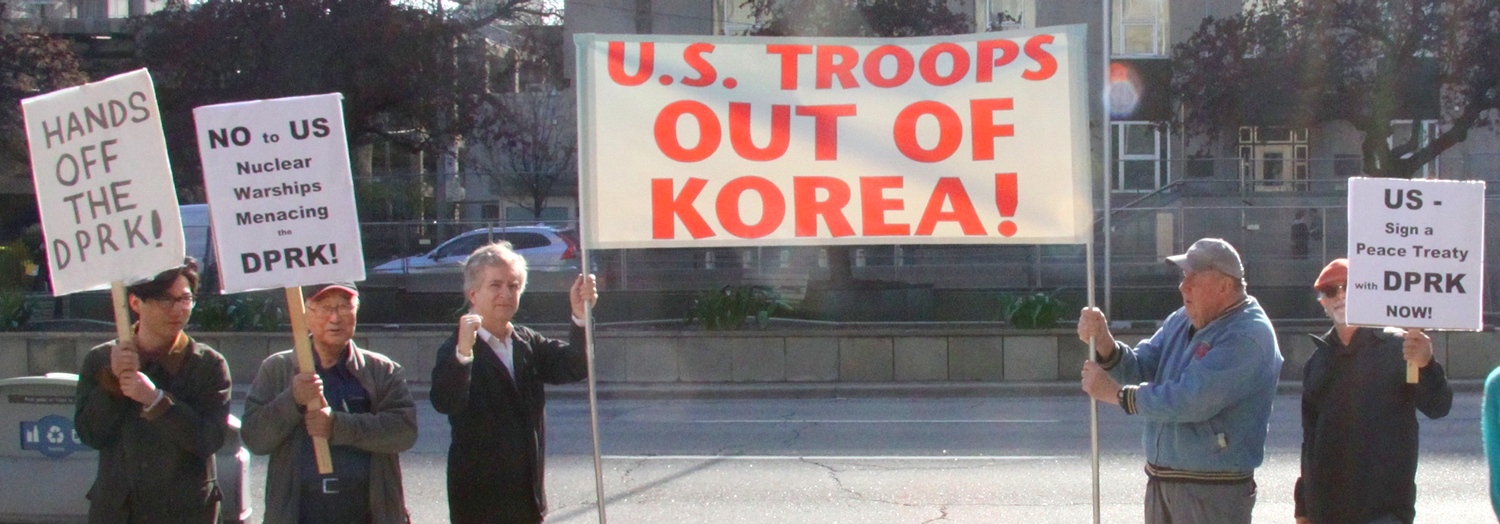
|
May 20, 2017 - No. 18 Dismantle NATO! Get Canada Out of NATO! Upcoming NATO
Leaders Meeting Takes Up
U.S. Administration's Agenda for War
Canada's
Defence
Policy
Review Dismantle NATO! Get Canada Out of NATO! Upcoming NATO Leaders Meeting Takes Up U.S. Administration's Agenda for War Ever since its founding in 1948 the North Atlantic
Treaty Organization (NATO) has been an aggressive military alliance. It
was established to block the striving of the peoples of Europe and the
world to establish governments which would provide their desire for
peace, freedom and democracy with a guarantee. Both militarily and
politically NATO's aim was to suppress the striving of the world's
peoples, led by communist and workers' parties following the Second
World War for sovereignty, genuine independence and socialism. Once the Soviet Union and people's democracies collapsed, instead of dismantling NATO, the U.S. and other NATO powers sought its expansion beyond the borders of the North Atlantic to force all the countries of Europe as well as targeted "partners" around the world to submit to the hegemonic striving of the U.S. superpower, systematically encircle Russia and force regime change against all countries which uphold their sovereign right to govern their own affairs. The need for the world's people to dismantle NATO is more urgent than ever, as is the need for Canadians to get Canada out of NATO. The U.S. Trump administration is using the meeting of heads of state and government of NATO member countries, to be held in Brussels, Belgium on May 24 and 25, as the staging ground for its aggressive plans to take over Europe and dominate Asia. Its plans reveal the grave dangers which lie ahead for all humanity. This will be the first international event attended by U.S. war president Donald Trump and he is using the occasion to parade his warmongering and threaten any who do not submit. Prime Minister Justin Trudeau will also participate with announcements of a "new defence policy" hatched behind the backs of Canadians with arms producers and warmongers. The Trudeau government's collaboration with the Trump administration while trying to create a "humanitarian imperialist" counterweight within NATO is evidence of the dangerous inter-imperialist contradictions within the bloc. The interests Trump represents are out to "resolve" these contradictions by imposing U.S. dictate in the most brutal way. At this time, the U.S. is said to be focused on ensuring NATO member states step up war preparations and military spending, and for NATO to take a formal role in the "fight against terrorism." NATO is expected to announce at or before the May 25 meeting that it is joining the U.S.-led "Global Coalition To Counter ISIS." Many NATO members are already part of the Coalition, however NATO is not officially. U.S. Chairman of the Joint Chiefs of Staff Joseph Dunford suggested on May 17 that NATO should also take over "training" of the Iraqi armed forces, which it had previously done following the last U.S. invasion of Iraq. "You might see NATO making a contribution to logistics, acquisitions, institutional capacity building, leadership schools, academies -- those kind of things," Dunford said. In the lead-up to the NATO meeting, the U.S. is expected to announce the deployment of up to 5,000 more soldiers to Afghanistan, bringing the number to more than 11,000. Another 5,000 soldiers from NATO countries are part of the U.S. occupation, which has been ongoing for 16 years. Media report that Britain will also send additional soldiers. The troop deployment follows the U.S. use of a weapon of mass destruction -- the so-called Mother of All Bombs -- against Afghanistan on April 13. The U.S. imperialists' dictum "you're either with us, or with the terrorists" is again the rallying cry, with its overwhelming dominance of the nuclear arsenal within NATO as the bargaining chip. Likewise, in a press conference on May 16, U.S. ambassador to the United Nations Nikki Haley declared, "You either support North Korea, or you support us." In that regard, surrounding the NATO meeting are other international visits in which the U.S. is calling for unity behind it in its warmongering against Korea, Iran, Afghanistan, Syria and others. The NATO summit will be followed by a G7 Leaders' Summit in Taormina, Italy, May 26 to 27.[1] Leading up to the NATO meeting, U.S. President Trump is visiting Saudi Arabia, Israel (via the first-ever direct flight from Saudi Arabia) and Vatican City (as part of a trip to "reaffirm America's global leadership"). Trump's National Security Advisor H.R. McMaster stated, "This trip is truly historic. No President has ever visited the homelands and holy sites of the Jewish, Christian, and Muslim faiths all on one trip. And what President Trump is seeking is to unite peoples of all faiths around a common vision of peace, progress, and prosperity. He will bring a message of tolerance and of hope to billions, including to millions of Americans who profess these faiths." "He will encourage our Arab and Muslim partners to take bold, new steps to promote peace and to confront those, from ISIS to al Qaeda to Iran to the Assad regime, who perpetuate chaos and violence that has inflicted so much suffering throughout the Muslim world and beyond," McMaster said. According to media, in Saudi Arabia at a meeting of regional heads of state on May 21 the U.S. will propose a new formal military bloc of Arab countries under U.S. leadership, a so-called "Arab NATO." According to reports, early members would be Saudi Arabia, the United Arab Emirates, Egypt and Jordan. The grouping would take up a crusade against countries in the region that are resisting U.S. domination, such as Syria and Iran. A 10-year U.S.$110 billion arms agreement between the U.S. and Saudi Arabia was announced on May 20, including warships, THAAD missile defence systems, armoured vehicles, missiles, bombs and munitions, media report. TML Weekly vigorously denounces this NATO summit as well as the G7 meeting and adds its voice to those of the thousands of people who are expected to protest these events. No to NATO! No
to the G7!
All Out to Dismantle NATO! Get Canada Out of NATO! Canada's Defence Policy Review Warmongers Should Not Be Permitted to
|
|
|
Canadians Uphold the Cause of Peace and Freedom
Victory Day Marches Honour Sacrifice
of Anti-Fascist Fighters
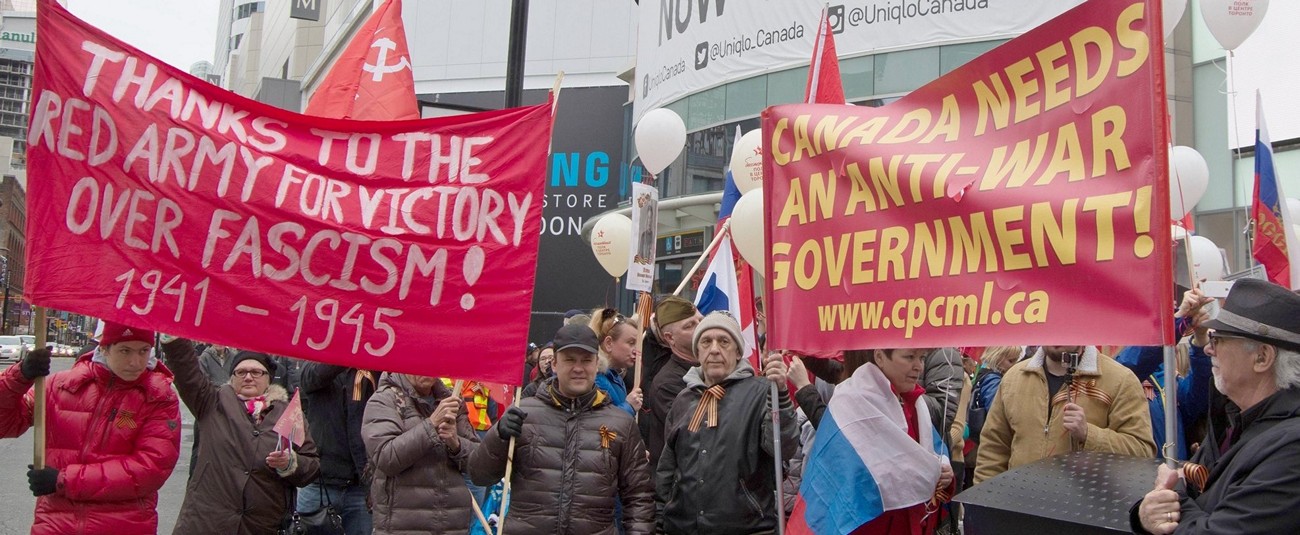
Toronto, May 6, 2017
May 9, 2017 marked 72 years since the anti-fascist front of the peoples, with the communists, resistance movements and the Soviet Union at the head, achieved victory over Nazi-Fascism in Europe. At midnight, Moscow time on May 9, 1945 Germany signed its unconditional surrender to the Allied powers in Berlin. Since then, May 9 has been celebrated in the former Soviet Union and around the world as Victory Day to honour those who fought and sacrificed their lives to contain fascism and to repeat humanity's call of Never Again!
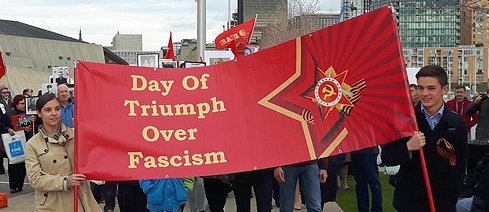
Ottawa, May 9, 2017
This year, Canadians held events in several cities,
including Montreal, Ottawa, Toronto, Edmonton and Vancouver, to pay
tribute to the anti-fascist fighters. The rallies and parades are known
as the March of the Immortal Regiment, in which participants bring
portraits of relatives or others who took part in the anti-fascist war
to honour their contribution. The marches began in 2012 in Tomsk,
Russia. Another 120 cities and towns participated the following year
and millions of people have taken part in subsequent years in Russia
and other former Soviet republics and around the world.

May 9, 2017 march in Volgograd, Russia (formerly Stalingrad),
where one of the war's decisive battles took place.
More than 25 million Soviet citizens were killed during
the war and
countless more suffered terrible injuries. Millions also took part in
the resistance movements throughout Europe and Asia. More than 1.1
million Canadians served in the armed forces during WWII, more than
44,000 lost their lives and 54,000 were wounded. Contingents from the
Communist Party of Canada (Marxist-Leninist) participated in this
year's Victory Day rallies to honour the
sacrifice of the peoples and oppose the stepped-up war preparations of
the U.S. imperialists and their allies today.
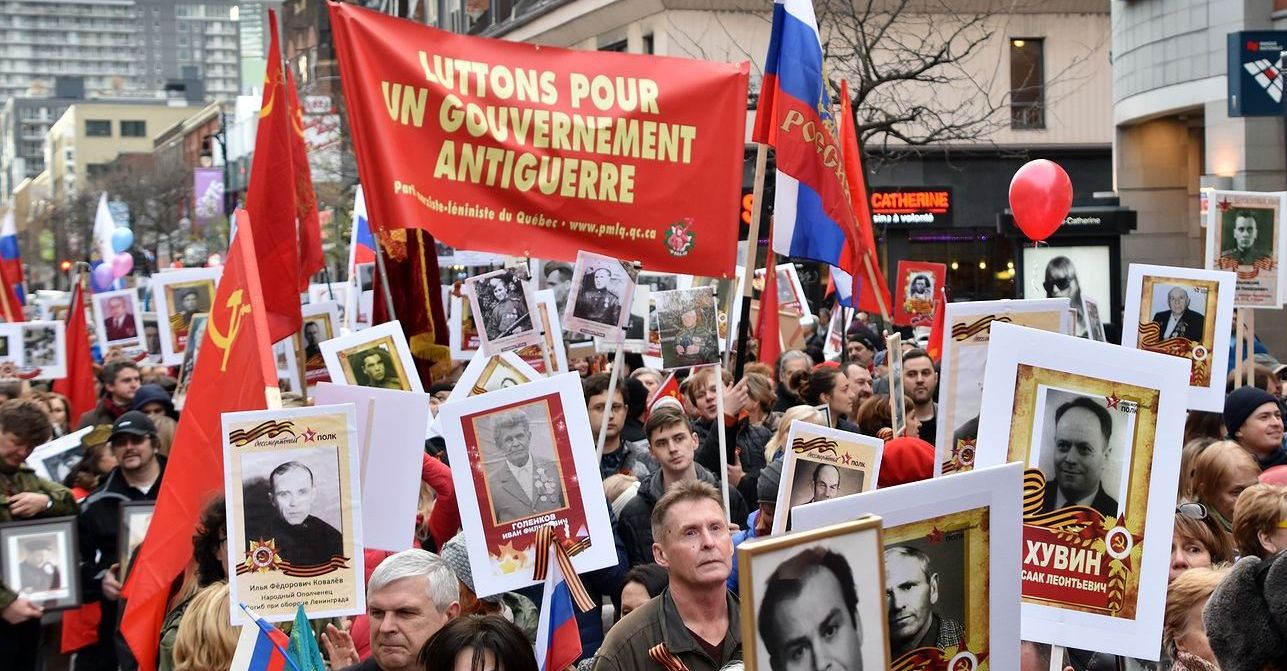
Montreal, May 9, 2017
In Montreal, hundreds marched carrying portraits, Soviet
flags, banners and a giant ribbon of Saint George (used in high
military decorations in Russia and the Soviet Union) ending at Cabot
Square with speeches. A plane flew overhead trailing a ribbon of Saint
George emblazoned with the words "May 9 -- Victory Day."
In Ottawa, participants marched to the Canadian War Museum for a
program of speeches and music. A delegation from the embassy of the
Russian Federation in Ottawa participated with portraits of their own
relatives.
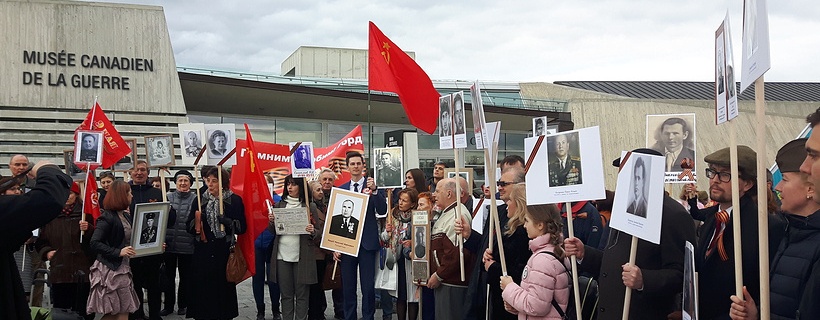
Ottawa, May 9, 2017
A rally and march was held on May 6 in Toronto, with
hundreds converging at Yonge and Dundas before marching to the war
memorial at Old City Hall. The event also commemorated the third
anniversary of the Odessa Massacre, in which more than 100 people were
killed at the Trade Unions House in Odessa, Ukraine on May 2, 2014 by
fascist criminals backed by the coup regime in Kiev.

Toronto, May 6, 2017
In Vancouver, two days of events were held, with a
rally on May 6
at the Vancouver Art Gallery followed by an evening concert, and a
march the next day at the All Saints Monastery in Dewdney, east of
Vancouver.

Vancouver, May 6, 2017

Dewdney, May 7, 2017
Millions more marched in countries of the former Soviet Union and around the world.
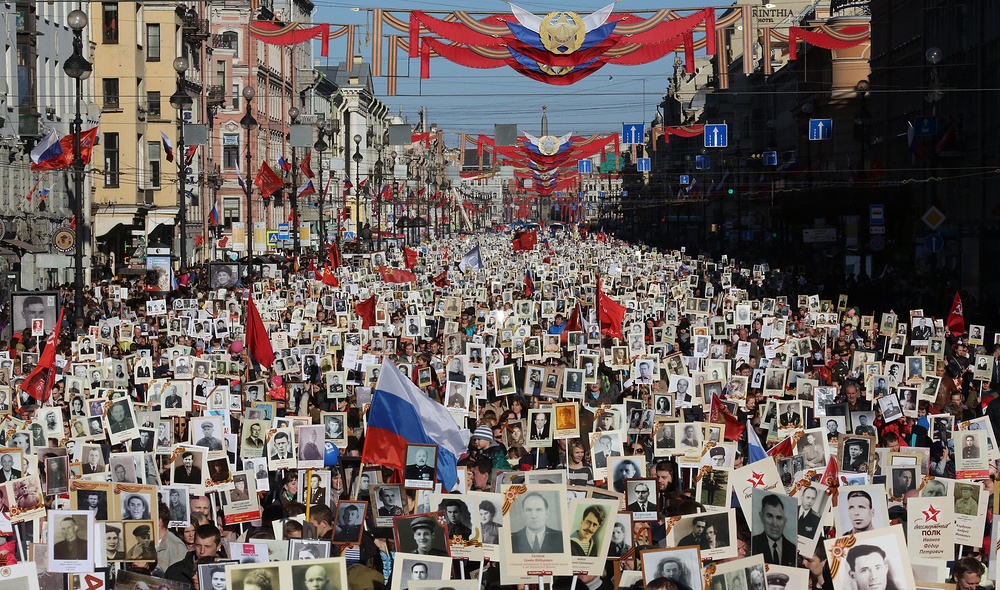
Moscow, Russia, May 9, 2017
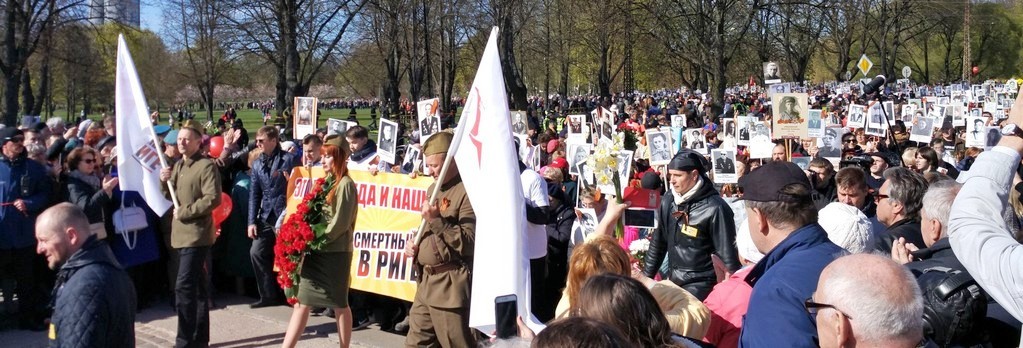
Riga, Latvia, May 9, 2017
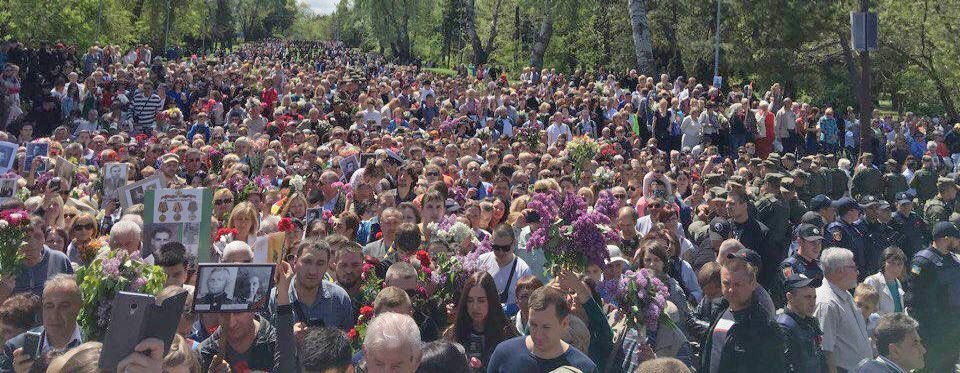
Odessa, Ukraine, May 9, 2017
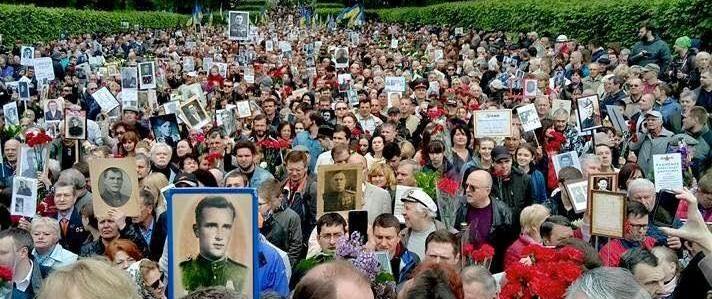
Kiev, Ukraine, May 9, 2017
(Photos: TML, TASS, my-vancouver.ca, @zapoponio, J. Trefz, E. Lukacs)
Call for Fair and Independent Investigation of
May 2, 2014
Massacre in Odessa, Ukraine

Dear Member of Parliament,
In the commemoration of the third anniversary of the tragic events in Odessa on May 2, 2014, the Russian Congress of Canada (RCC) remembers those who fell victim to the violence of right-wing Ukrainian radicals and draws attention to the failure of Ukrainian authorities to properly investigate and prosecute the culprits. RCC calls upon the Canadian government to exercise its influence on official Kyiv so that the investigation [can] be brought to a conclusion, the truth be known and justice served in this, one of the darkest pages of recent Ukrainian history.
On May 2, 2014, Odessa
became a place of tragedy. Dozens of
people died in the outbreak of violence against citizens of the
city and surrounding region who did not support the "Euromaidan"
regime change in Kyiv ten weeks earlier. Protesters set up a tent
camp on Kulikovo Pole square in the centre of Odessa as a place
of peaceful gathering. They were collecting signatures for a
proposal to conduct an all-Ukrainian referendum on
decentralization of Ukraine's central government powers and
recognition of Russian as the second official language of the
country. These demands have always been shared by the people of
southern and eastern Ukraine, who historically, culturally, and
linguistically have been close to Russia. However, successive
governments in post-Soviet Union Ukraine have never agreed to
these demands.
Kulikovo Pole became the centre of anti-Maidan activists. Odessa city and the region were split over support of Euromaidan, with pro and anti-Euromaidan marches and public rallies taking place throughout February-April 2014. On May 2, hundreds of football ultras, known for their support of right-wing Ukrainian nationalism, arrived in Odessa on buses to attend a match. Members of extremist, paramilitary 'self-defence' units of Euromaidan from various Ukrainian cities also arrived to Odessa that day. They joined with local football ultras and paramilitaries to organize a march for [the] unity of Ukraine through the centre of the city. The Anti-Maidan activists organized their groups in central Odessa. The two sides came into conflict and police did little to prevent the violence that erupted. Six people died in clashes, and many more were injured.
By 6:30 pm, nationalist ultras reached the Kulikovo Pole square. They attacked and burned the camp down, using Molotov cocktails, cobblestones and firearms. They beat the Kulikovo camp activists with baseball bats and chains. The activists took refuge in the House of Trade Unions close to the camp. The right-wing radicals encircled the building and set it on fire, trapping activists inside. Some of those inside tried to escape the fires by fleeing to the roof of the building. From there, some were eventually rescued. Others jumped from the windows on the second and third floors. Some of those were then beaten to death by the gathered extremists. Inside, many were burned alive or died from suffocation.
According to official statistics, 42 people died in the fire in the Trade Unions House on May 2. However, the number of victims was most likely over a hundred, according to relatives and witnesses. Many survivors were seriously injured. Some of them were taken to hospitals but did not stay there. Relatives took them away, fearing that they would be killed by extremist vigilantes. Others did not even go to hospitals out of fear of being reported to authorities and arrested. Some of the survivors died of injuries.
The massacre occurred under the eyes of the police who were observing but did not intervene because, police officials later said, they had "no orders" to act. Police superiors were attending an unscheduled meeting which had been called by higher authorities and lasted several hours. The fire brigade, located within 0.5 km [of] the Trade Unions House, received numerous calls for assistance but it took them 45 minutes to arrive.
Ukrainian authorities launched five separate investigations of the Odessa massacre -- by the General Prosecutor, by the Ministry of Interior, by a special Parliamentary Commission, by the Ukrainian Ombudsperson and by the police department in Odessa. None of these investigations have been concluded. Almost all of those who have been arrested in relation to the May 2 events and currently face criminal charges belong to the federalist, anti-Maidan camp. They are all accused under identical charges of "causing mass disorder" instead of being individually charged with specific offenses. None of the right-wing nationalists responsible for the murders at the Trade Union House have been charged. As late as March 24, 2017, the EU-Ukraine Parliamentary Association Committee was still demanding "further progress in the investigations into the crimes committed during the Euromaidan protests and the violence in Odessa of 2 May 2014, in order to bring to justice those responsible without delay."[1]
Three years after these tragic events, it is clear that Ukraine's authorities intentionally impede the progress of investigations. The prosecution has been unable to produce any convincing evidence against the accused federalists and supporters of Ukraine's friendly relations with Russia. Numerous legal and procedural violations have been observed during the proceedings. On a number of occasions, right-wing extremists broke into courtrooms during proceedings, threatened judges, defense lawyers and families of the defendants and physically assaulted them. In several cases, judges recused themselves from the investigation for fear of nationalist reprisals. Documentary evidence has been tampered with. The investigation has been sabotaged at the highest level of Ukraine's Ministry of Interior.[2]
Ukrainian authorities clearly lack the will to bring the investigations to conclusion for one simple reason -- the same people and institutions that bear responsibility for the Odessa tragedy are in charge of investigating it. The International Advisory Panel of the Council of Europe concluded in November 2015 that the Ukrainian government had failed to properly investigate and prosecute those responsible for the violent clashes in Odessa on May 2, 2014. The European experts found that Ukraine's investigations into the "mass disorders" in the city centre, the fire in the Trade Unions House and the conduct of the State Emergency Service staff in response to the fire lacked institutional and practical independence.[3]
The Ukrainian government's failure to identify and prosecute the perpetrators of the Odessa massacre has cast serious doubts about democracy and the rule of law in post-Euromaidan Ukraine. The current Ukrainian rulers and their ardent supporters in the West, including the Canadian Foreign Affairs Minister Chrystia Freeland and the Ukrainian Canadian Congress, claim that Ukraine is successfully reforming its law-enforcement agencies and the Prosecutor General's Office. According to the statement made by the Ukrainian Canadian Congress to the Parliament of Canada's Standing Committee on Foreign Affairs and International Development on March 23, 2017," there are many positive examples of what has changed on the ground (in Ukraine). We are on the path, with the judicial system, with police reform, to fundamentally change the lives of Ukrainian citizens, and provide an example to people in Belarus and Russia of what is a better future."
How successful are these reforms if none of these agencies proved willing or able to bring mass murderers to justice even three years after the Odessa massacre? Ukrainian society needs to know the truth, which is denied to them by the Ukrainian authorities. Nationalist radicals guilty of killing innocent civilians in cold blood should be held accountable for their actions.
Yet it is unlikely that in today's Ukraine justice will be served without any external help. As in the case of unidentified sniper killings on Maidan in February 2014, high-ranking officials in Kyiv have proven themselves uninterested in honest and effective investigations of the Odessa Massacre because it might reveal the involvement of current power holders in these killings. Ukraine's government has denied and covered up the involvement of the extreme right nationalists and their paramilitaries in the escalation of violence on Euromaidan and the persecution of pro-Russian Ukrainians across the country. Meanwhile, hundreds of people who opposed the Euromaidan have been arrested and detained illegally. Far-right thugs routinely intimidate and attack those who dare to publicly voice their disagreements with the Ukrainian ultra-nationalism. The government does nothing to protect the rights of the attacked.
The failure of the Ukrainian authorities to investigate the tragedy of May 2, 2014 in Odessa calls for an immediate action by the Government of Canada. If all members of Mr. Trudeau's cabinet care about the people of Ukraine and want them to live in inter-ethnic peace, there should be no difficulty on the part of our Government to pressure Mr.Poroshenko and the Ukrainian government as a whole to name and prosecute those responsible for the deaths of ordinary Ukrainian citizens in Kyiv and Odessa.
We call upon the Government of Canada to hold the Ukrainian government accountable for bringing to a conclusion the investigation into the Odessa tragedy. Only truth and justice can bring reconciliation and forgiveness.
On behalf of the Russian Congress of Canada,
Igor Babalich President
Notes
1. Final statement and
recommendations of the EU-Ukraine parliamentary association
committee of March 24, 2017: here.
2. A call for an international
investigation into the violent events in Maidan and Odessa by the
Human Rights Agency with the Economic and Social Council of the
United Nations (ECOSOC), March 21, 2016: here.
3. Press-release of the International Advisory Panel on
Ukraine on the investigation of May 2014 events in Odessa,
November 4,
2015: here.
Report of the International Advisory Panel on the May
2014
tragedy in Odessa and its
investigation: here.
(May 1, 2017)
Nakba Day Actions Uphold Palestinians' Right of Return and Call to End the Occupation Now!

Montreal, May 13, 2017
May 15 marked the 69th anniversary of al-Nakba, Arabic for "catastrophe," the forcible expulsion of 750,000 Palestinians from their homeland by the Zionists in order to annex their land into the state of Israel, which the Anglo-American imperialists had brought into being just four days before. The Palestinians were dispossessed of 4.2 million acres of land by Zionist militias. The anniversary of al-Nakba is an occasion for the Palestinian people, joined by the world's peoples, to affirm the right of Palestinians to return to their land and the need to end the occupation.
This year, Nakba commemorations drew special attention
to the more than 1,500 Palestinian prisoners on hunger strike in
Israeli prisons since April 17. The Freedom and Dignity Strike is
demanding humane conditions in the prisons and an end to the medical
neglect of jailed Palestinians.
Toronto, May 13, 2017
In Canada, demonstrations in Montreal, Ottawa and Toronto showed Canadians' support for the striking prisoners and condemned the Canadian government's support for the Zionist occupation. Many drew attention to the fact that Prime Minister Justin Trudeau, in a May 2 statement, for the first time, declared Canada's commitment to "fight anti-Zionism" and condemned this attack on the right to conscience. Protestors also affirmed the need to provide the facts about the dispossession of the Palestinians that are routinely covered up by the U.S. imperialists and their media.
By 1949, the year following al-Nakba, Israel occupied 78 per cent of Palestinian land. Between 1948 and 1950 more than 500 Palestinian towns and villages were systematically destroyed or repopulated. Today, more than half of the 11.5 million-strong Palestinian people are refugees from the Nakba and subsequent forced displacement and genocide. Israel continues to deny these refugees the right of return to their stolen homeland and continues the annexation of their lands through the construction of settlements on Palestinian lands. This must not pass!
The right of return
is well-founded in international
law, but is routinely denied and dismissed, while settlers
from Europe and the United States are rewarded for expanding
illegal Israeli settlements on internationally-recognized
Palestinian territory.[1]
Since coming to power in the October 19, 2015 federal election, the Trudeau Liberals have not expressed a single criticism of Israel's genocidal actions. Even the increasingly-aggressive expansion of illegal settlements, which both the Obama and Trump administrations in the U.S. were forced to criticize publicly, have not been mentioned by Canada. While Canada issues interventionist statements against Venezuela, which has never attacked anyone, it praises Israel's "democratic values" and commitment to "peace."
On the occasion of Nakba Day 2017, the peoples of the world affirm that there is no more pressing injustice to be rectified than the Zionist occupation of Palestine and all the heinous crimes perpetrated under its existence. TML Weekly salutes the heroic Palestinian prisoners and their resistance struggle and calls on everyone to stand in defence of the rights of all and step up their actions to defend the Palestinian people and their right of return.
Uphold the Right of Return!
End the Occupation Now!
Victory to the Palestinian Prisoners!

Ottawa, May 13, 2017
Note
1. The Universal Declaration of
Human Rights says, "Everyone has the right to leave any country,
including his own, and to return to his country." The
International Convention on the Elimination of All Forms of
Racial Discrimination affirms this right with the emphasis that
it cannot be denied on the basis of "race, color, or national or
ethnic origin." The Fourth Geneva Convention states that persons
evacuated by an Occupying Power during warfare must be
transferred back to their homes as soon as hostilities cease. The
International Convention on Civil and Political Rights states,
"No one shall be arbitrarily deprived of the right to enter his
own country." UN General Assembly Resolution 194 adopted on
December 11, 1948 declares that the Palestinian refugees "wishing
to return to their homes and live at peace with their neighbors
should be permitted to do so at the earliest practicable date."
Resolution 194 has been reaffirmed by the UN General Assembly
more than 110 times since its first adoption. UN General Assembly
Resolution 3236, adopted in 1974, affirms "the inalienable right of
Palestinians to return to their homes and property from which they have
been displaced and uprooted, and calls for their return."
New Illegal U.S. Attacks Against Syria
Hands Off Syria! U.S. Troops Out Now!
TML Weekly condemns the U.S. escalation of aggression against Syria and its violation of Syria's sovereignty and calls on Canadians to demand that all U.S. and Canadian military forces leave Syria and Iraq and end all efforts towards regime change to enforce U.S. imperialist hegemony over the region.
The government of Syria and its armed forces confirmed that the U.S. carried out two new acts of aggression against Syrian forces on May 17 and 18. In both cases, U.S. airstrikes targeted Syrian military forces in Tanf, near the country's borders with both Jordan and Iraq. Syrian soldiers were killed and equipment, including tanks, destroyed. The Syrian army and its allies have recently been advancing east, retaking areas formerly controlled by ISIL. The U.S. pretext for the attacks was that Syrian forces came too close to a small outpost which has been occupied by U.S. and British Special Forces and forces under their command for a little over a year.
A statement from the Syrian Arab Army affirmed that it "is fighting terrorism on its territory, and no party whatsoever has the right to determine the course and destination of the army's operations against the terrorist organizations, mainly ISIS and al-Qaeda." The U.S. military occupation of Syrian territory is illegal and illegitimate and the U.S. has no right to dictate what parts of its own territory Syria's armed forces can operate on. Syria's ambassador to the United Nations, Bashar al-Jaafari denounced the U.S. aggression and stated that Syria will fight not only the terrorism of armed groups but the state terrorism of the U.S., France, Britain and others against Syria.
U.S. Troop Buildup Against Ceasefire Agreement
The latest U.S. attack against Syria comes in the context of a buildup of U.S. troops on the Jordanian/Syrian border. According to regional media, since April more than 4,000 U.S. soldiers and more than 400 military vehicles have been deployed to a base east of Az-Zarqa, 43 kilometres away from the Syrian border.
On May 6 and 7 the U.S. led "Eager
Lion" military exercises in Jordan involving some 20 other countries
and 7,400 troops. U.S. and Jordanian officials said the manoeuvres
would include border security, cyber-defence, and "command and control"
exercises to bolster coordination in response to threats. A statement
from the Jordanian army said troops from Europe, Asia, Africa and the
Gulf region -- including from Britain, Japan, Kenya and Saudi Arabia --
are taking part in the exercise, which ran through May 18. U.S.
Major-General Bill Hickman, deputy commanding officer for the U.S. army
in the region, said this seventh annual exercise is "the largest and
most complex to date." The exercises are taking place amidst reports of
a general buildup of U.S. troops on the Syrian border in Jordan with
reports of more than 400 units of U.S. military equipment and more than
4,000 soldiers deployed along the border. The highlight of this year's
war games, he said, will be that "for the first time ever a global
strike mission" will be conducted by "two U.S. Air Force B-1B bomber
aircraft" -- a long-range multi-mission bomber.
While the number of U.S. troops increased on Syria's borders, attempts to enforce a ceasefire agreement between conflicting parties in the country went into effect on May 5. The Russian Federation, the Islamic Republic of Iran and the Republic of Turkey announced at a meeting in Astana, Kazakhstan the creation of "de-escalation areas" inside Syria and stated that they would act as guarantors of the ceasefire.
Within the de-escalation areas, hostilities between the Syrian army and armed opposition groups that have joined the ceasefire regime are to cease, humanitarian access is to be provided, conditions established to provide medical aid to populations and restore infrastructure, as well as for the return of refugees and internally-displaced persons. According to the official memorandum, the aim of the zones is to "put a prompt end to violence, improve the humanitarian situation and create favorable conditions to advance political settlement of the conflict in the Syrian Arab Republic." As well, military flights will not be permitted to take place over the areas concerned.
The de-escalation areas are now in effect in Idlib
province and certain parts of the neighbouring provinces (Latakia, Hama
and Aleppo); certain parts in the north of Homs province; in eastern
Ghouta; certain parts of southern Syria (Deraa and Al-Quneitra
provinces).
Venezuelan Measures to Overcome External Intervention and Counterrevolution
National Constituent Assembly Convened to Open Peaceful Path to Progress
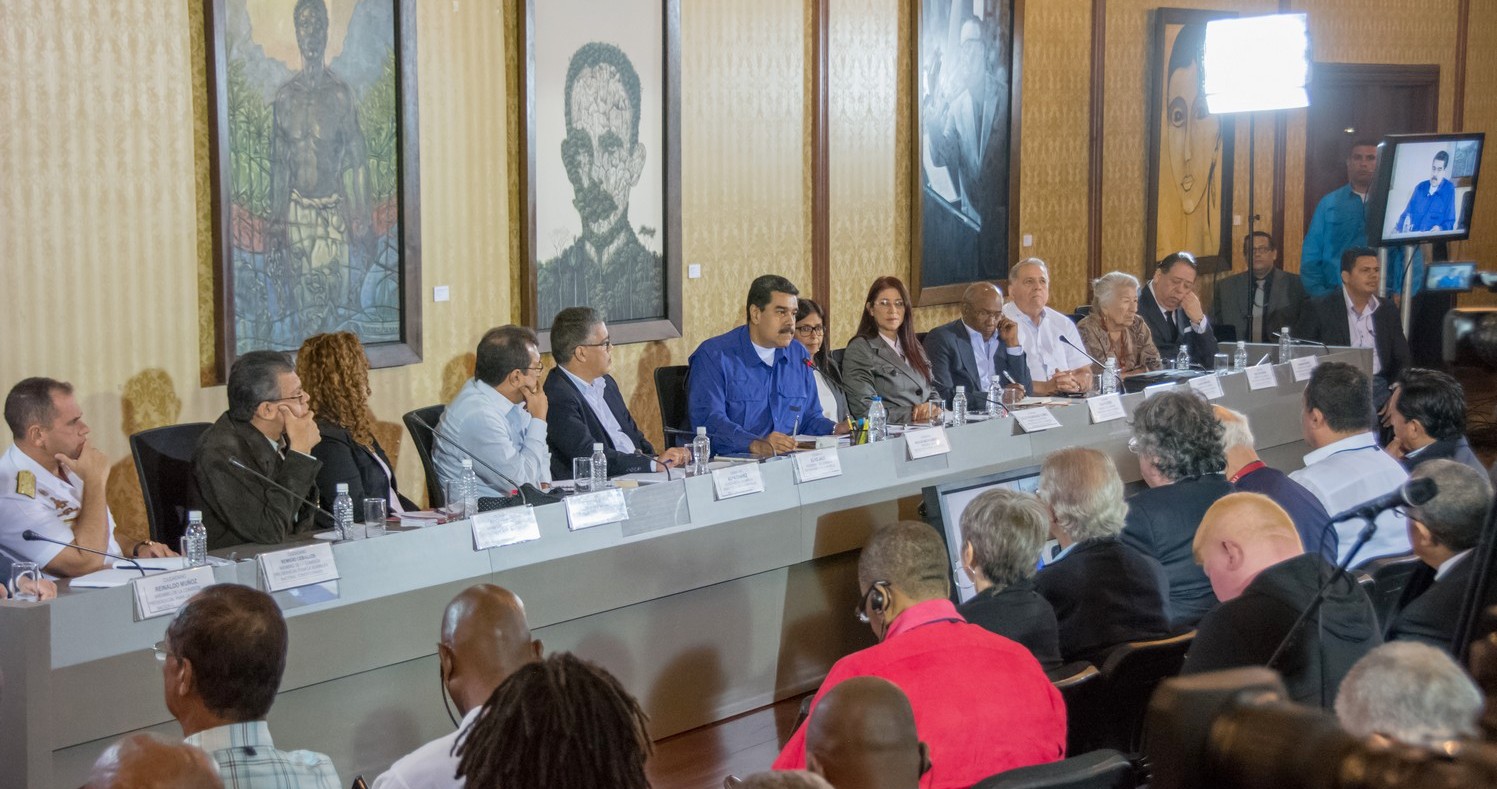
On May 12, Venezuelan President Nicolás Maduro Moros met with foreign guests from more than 35 countries to explain the decision to convene a Constituent Assembly at this time and the situation Venezuela is facing. The guests included organized workers, elected legislators, representatives of political parties, social movements and academics as well as journalists. Maduro was accompanied by members of the Presidential Commission for a Constituent Assembly.
Since it was struck on May 1,
the Presidential Commission has
convened meetings with all the sectors and collectives of the
Venezuelan people. The Commission has met with representatives of
organized workers, women, students, seniors, communes, media,
diplomatic corps, more than 17 political parties, small farmers
and fishers, business people, religious institutions, people with
disabilities, heads of universities and others and received their
proposals and views. As well, mass meetings and rallies are being
held throughout the country. All political forces in the country have
been formally invited to join and present their proposals as well as to
participate in elections for the Constituent Assembly.
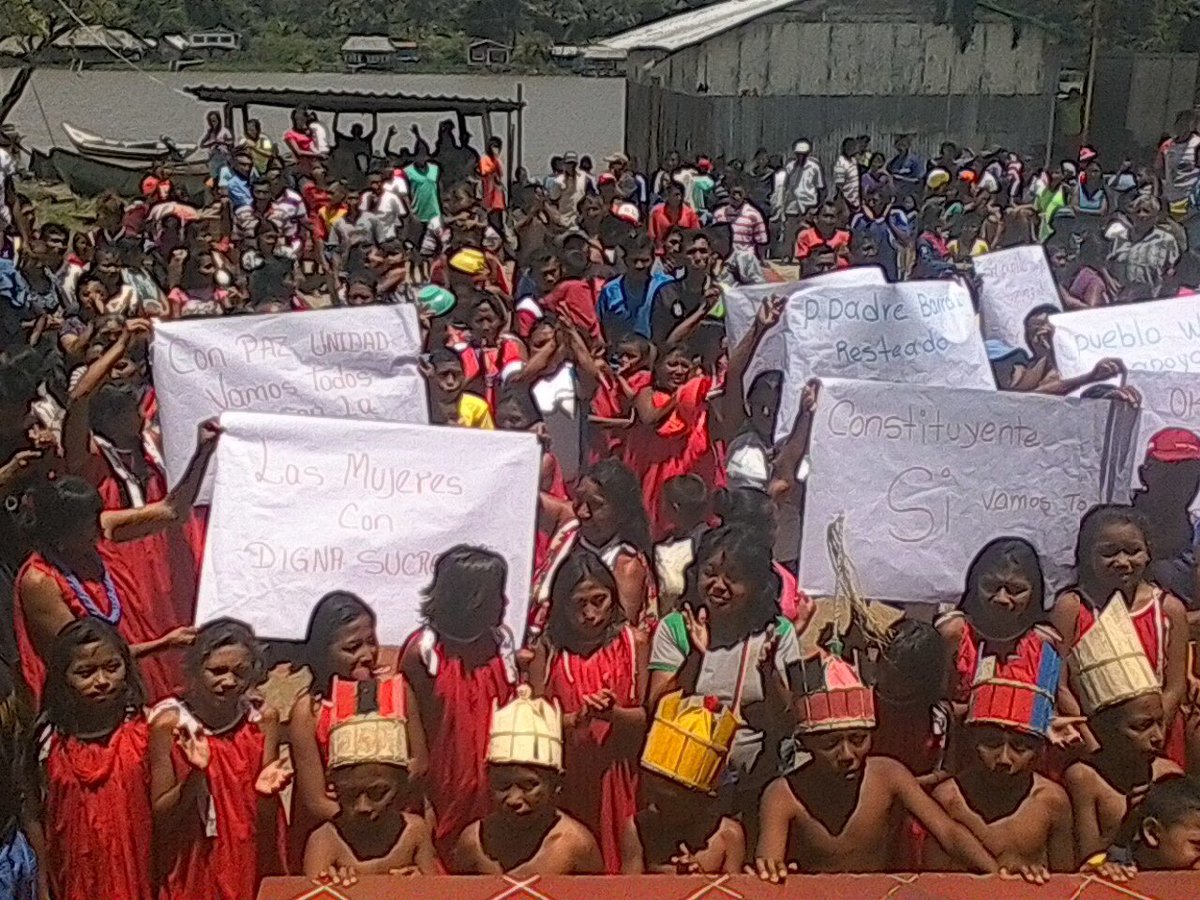
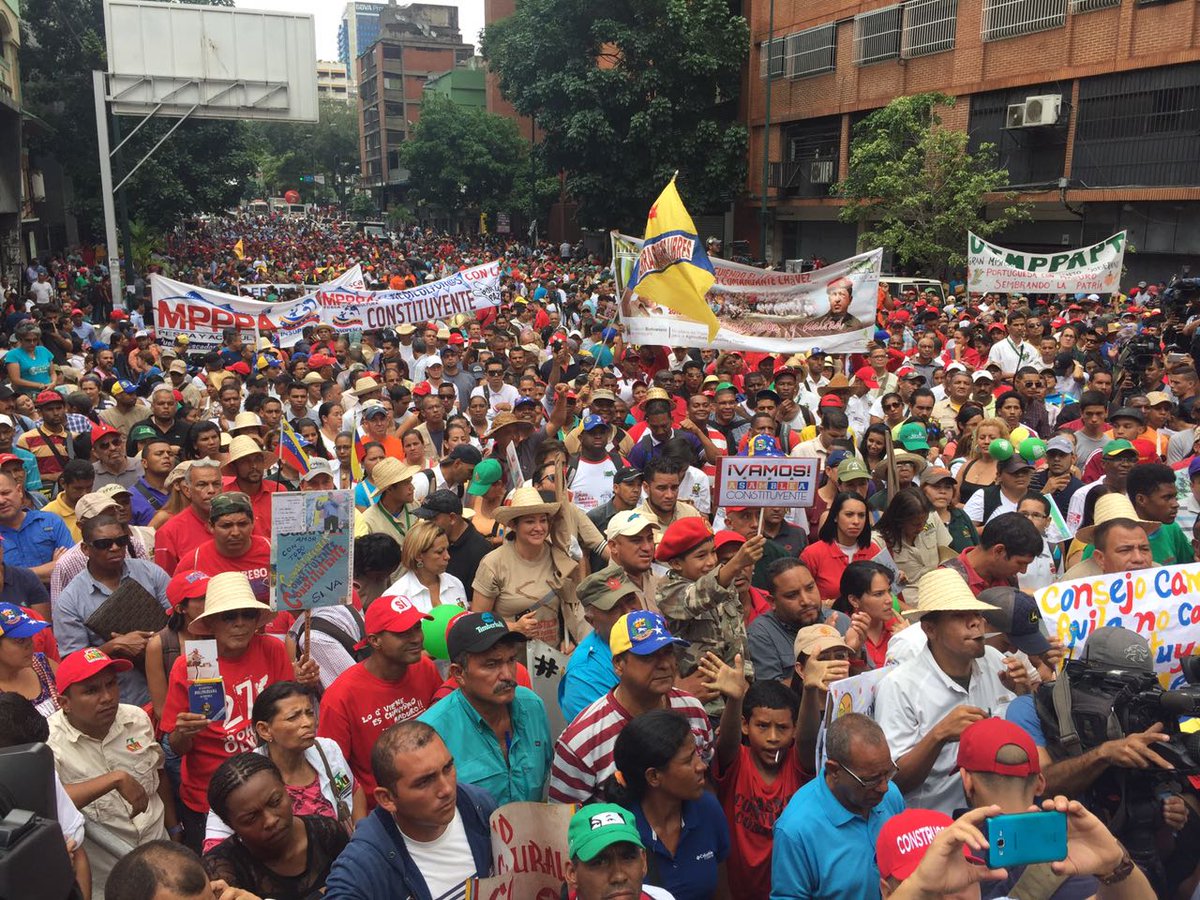
Left: Meeting of the Warao people on May 11, 2017 (Digna Sucre); right:
rally of small
farmers and fishers in support of Constituent Assembly
May 10, 2017.
President Maduro affirmed that, after 18 years of peaceful revolution and popular Bolivarian process, it is now important to renew the Constitution on which this is based. Venezuela is activating the highest power of the Republic to face the crisis and aggression the country is facing and to reconstruct the basis for peace and economic recovery, Maduro said.
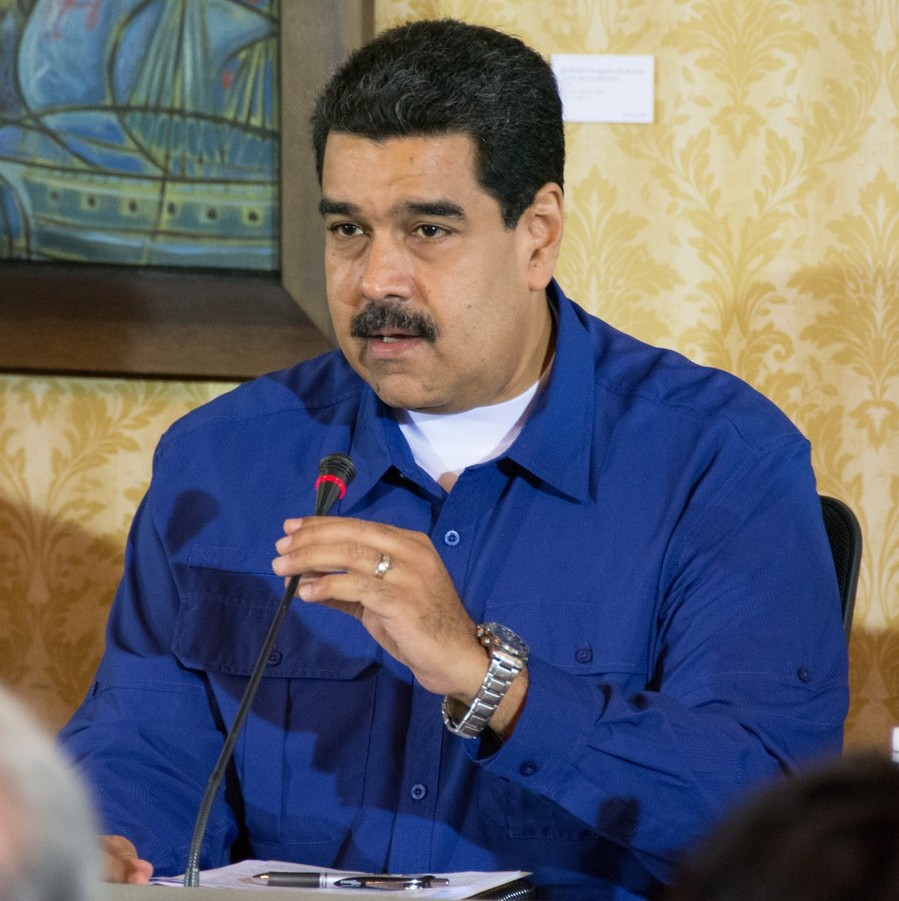 "We need to gear towards a
process of renewal,
refoundation. This can only be done through the forces of the
people, through a popular process and constituent process, by the
constituent power, which is the only power that could change
everything," he said.
"We need to gear towards a
process of renewal,
refoundation. This can only be done through the forces of the
people, through a popular process and constituent process, by the
constituent power, which is the only power that could change
everything," he said.
Despite the advances Venezuela has made in human
rights,
democracy and guaranteeing the people's well-being, President
Maduro explained that Venezuela is now facing violence that seeks
to take the country backwards.[1]
He referred to similar attacks in 2002, 2004 and 2014, which lasted
several months each time. However, despite the fact that the
"guarimbas" -- riots and street blockades in wealthy neighbourhoods or
that target public buildings -- are more concentrated than in the past
and affect only one per cent of the national territory, they are "far
more violent than ever before." There have even been cases where
participants have assassinated fellow protestors, he informed.
President Maduro conveyed his sympathy to all the families of victims
and called for mechanisms to do justice and permit reconciliation and
unity among Venezuelans. He further urged caution and noted that the
violence aims to trigger more violence.
"I prohibited the use of firearms, even small rifles that use rubber bullets, which are allowed by law," he affirmed.
There are three main reasons for the "ambush" launched in April against Venezuela, President Maduro explained. The first is the new Trump administration in the U.S., which has carried out aggressive actions against Syria, used the "Mother Of All Bombs" against Afghanistan and increased pressure on Latin America and Caribbean countries. Secondly, Maduro pointed to the slow recovery of Venezuela's revolutionary forces following their defeat in the 2015 National Assembly elections. "Our challenge is to build a new Bolivarian majority, and we will do it," President Maduro affirmed. Third is the serious economic problems Venezuela is facing and efforts to further derail its recovery, he said.
"If there is economic recovery in 2017, consolidation of the Local Food Production and Provision Committees [(CLAPs), which now serve 6 million households] and healing of the wounds of the economic war, [the forces of the oligarchy] know that in 2018 we will win, because in 2018 there will be Presidential elections," President Maduro said.
The strategy of calling a Constituent Assembly was the result of "intense debate in the political leadership of the revolution," Maduro said, and noted that it aims to "break the strategy of national and international foes. What were the options open to us? [Counter-revolutionaries] have decided to assault [the people's] power via the rebellion in the streets. Until when, only God knows. The vast majority of this country, more than 80 per cent, reject the violence. We will move to a new horizon of peace through the Constituent Assembly," Maduro said.
The Constituent Assembly is crucial "to move the country forward and solve and address national threats. This is the option that will allow us to solve the social, political and economic problems through national dialogue, in order to start overcoming the coup attempts and imperial intervention," Maduro said. "[This is a] project for emancipation for all Venezuelans. We want to fulfil this by means of this Constituent Assembly."
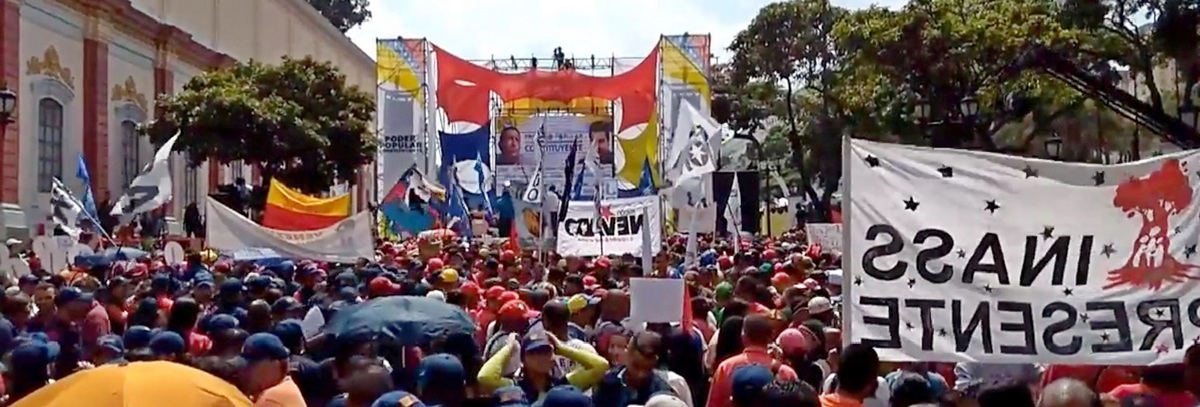
Caracas demonstration calls for constitutional recognition of
Venezuela’s communes and communal councils, May 9, 2017.
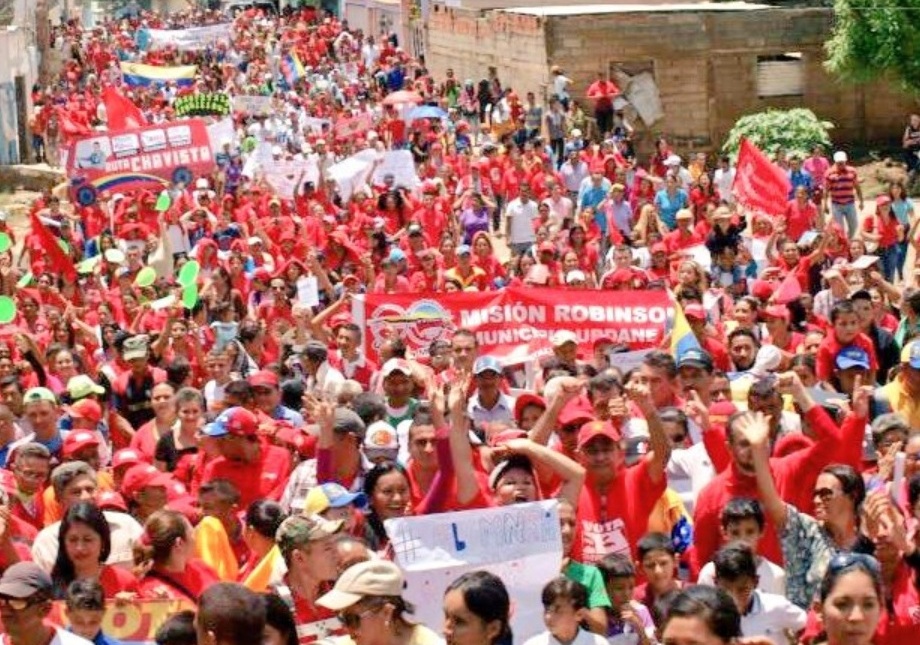

Demonstrations
in support of Constituent Assembly in Lara (left) and Quibor, May
14, 2017.

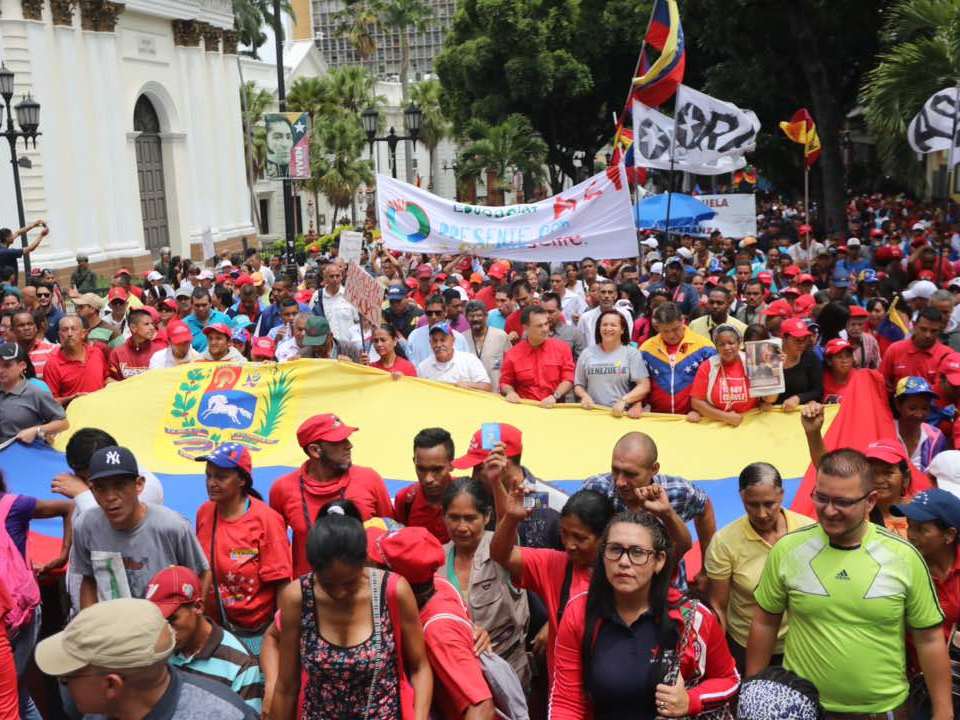
Rallies of food industry workers in Caracas (left) and health care
workers in Aragua state,
May 19, 2017.
Note
1. In one characteristic
example, on May 17, a maternity hospital was attacked in Miranda state
after being besieged for two days by counterrevolutionary protestors.
Women and infants had to be evacuated after smoke from burning rubble
outside entered the building. Doctors, specialists and nurses were
prevented from entering the building for their shifts.
In another, on May 14, a public bus in Caracas was torched after its
route was blocked by a reactionary protest. The driver told media, "If
they had known that I support the Revolution, they would have killed
me."
(Photos: TML, TeleSUR, Venezuelanalysis, Voces Urgentes, AVN, @sasitsansebast16)
Canada Works to Undermine Peaceful Solution
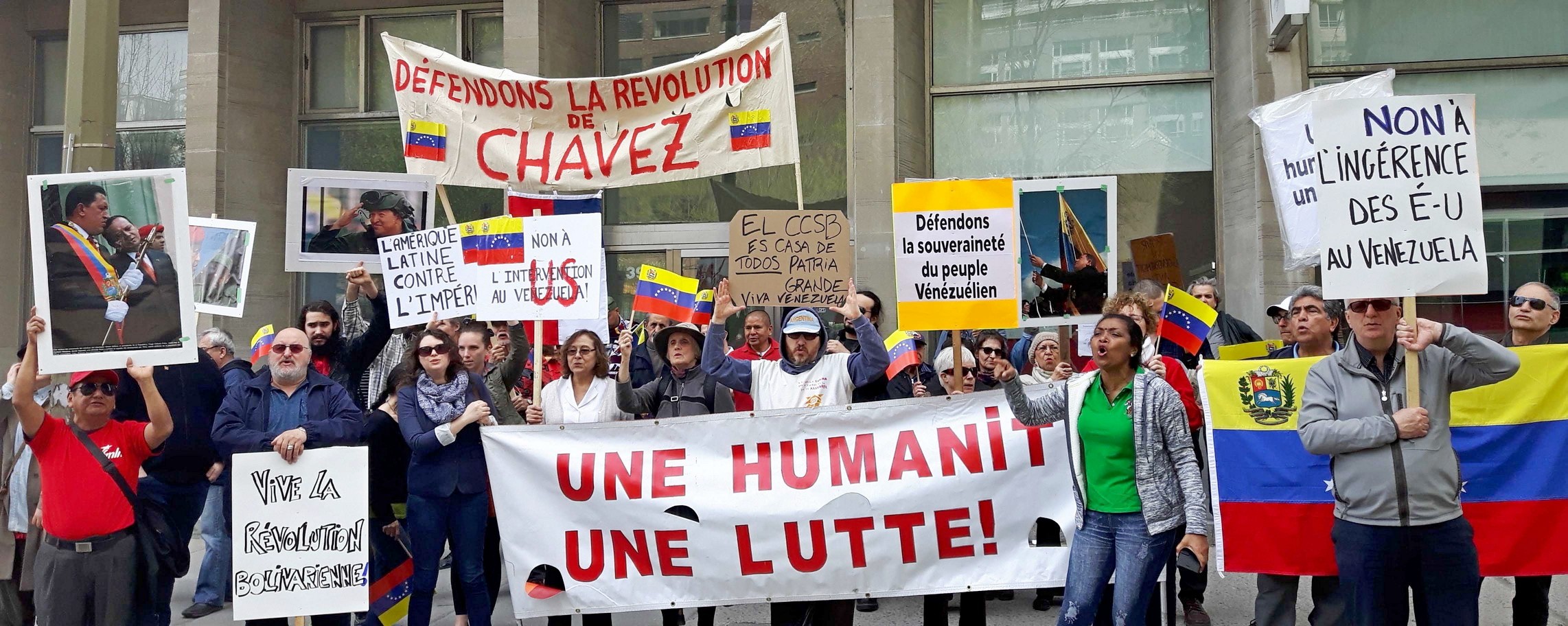
May 13, 2017 Montreal picket opposes foreign intervention and attacks
on Venezuela's
diplomatic staff in Canada.
The government of Canada is continuing its activities to undermine a peaceful solution in Venezuela and interfere in its internal affairs.
Canada's Minister of Foreign Affairs Chrystia Freeland
issued statements opposing Venezuela's decision to withdraw from the
Organization of American States on April 27 and the convoking of a
Constituent Assembly on May 4. Despite the fact that both of these
decisions are based on Venezuela's constitution and its rights as a
sovereign country, Canada demanded that Venezuela "restore
constitutional order" and stated, "Free and fair elections including
all of Venezuela's eligible voters are required to solve the country's
crisis."
This sleight of hand covers up that not only are all of Venezuela's eligible voters now given the opportunity to elect representatives to renew the country's constitution and put forward their visions for Venezuela, that constitution will then be put to a referendum, followed by elections at all levels including Presidential elections in 2018. This is mandated by Venezuela's constitution, which also sets the framework for the convening of the Constituent Assembly.
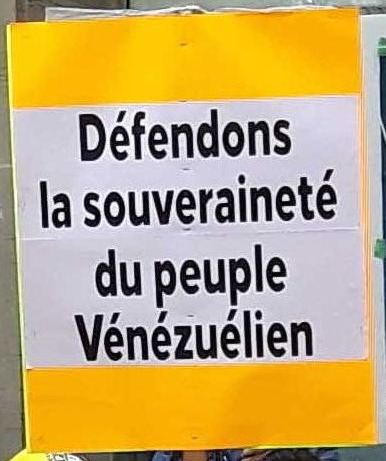 Meanwhile, on May 16, Prime
Minister Justin Trudeau along with former MP Irwin Cotler met with
Lilian Tintori, wife of convicted Venezuelan criminal and 2002 coup
d'état participant Leopoldo López, currently serving a
sentence for inciting violence leading to the deaths of 43 people in
2014. Tintori was incorrectly described as a "Venezuelan human rights
activist" and on this basis given a platform to declare Venezuela to be
a dictatorship and justify the counterrevolutionary violence that has
led to more than 50 deaths since April and the targeted killings of
supporters of the Bolivarian Revolution. Tintori also met with Rona
Ambrose, interim leader of the Conservative Party, and Thomas Mulcair,
leader of the New Democratic Party.
Meanwhile, on May 16, Prime
Minister Justin Trudeau along with former MP Irwin Cotler met with
Lilian Tintori, wife of convicted Venezuelan criminal and 2002 coup
d'état participant Leopoldo López, currently serving a
sentence for inciting violence leading to the deaths of 43 people in
2014. Tintori was incorrectly described as a "Venezuelan human rights
activist" and on this basis given a platform to declare Venezuela to be
a dictatorship and justify the counterrevolutionary violence that has
led to more than 50 deaths since April and the targeted killings of
supporters of the Bolivarian Revolution. Tintori also met with Rona
Ambrose, interim leader of the Conservative Party, and Thomas Mulcair,
leader of the New Democratic Party.
According to media reports, Tintori spread utter falsehoods to Trudeau to justify further violence and foreign intervention, telling the Prime Minister, "[the Venezuelan government has] killed 51 people during the protests because the dictatorship's order is to shoot without mercy." The Venezuelan government has prohibited police or national guard assigned to protests from carrying any firearms, even to fire rubber bullets. Of the more than 50 deaths since the violent actions began, eight have been attributed to Venezuelan authorities, for which individuals have been arrested and charged.
Also on May 16, the House of Commons Subcommittee on International Human Rights held its second meeting in two months attacking Venezuela, featuring Tintori and her legal counsel Jared Genser, head of a public relations and legal firm specializing in taking up the cause of so-called political prisoners in countries the U.S. is targeting. As with all the numerous Parliamentary meetings on Venezuela in recent years, no attempt was made to seek the opinion of other political forces in Venezuela -- including political parties, trade unions and citizens' organizations -- besides those opposing the Bolivarian Revolution.
Venezuelan consular officials in Canada have also faced serious harassment and threats. In Toronto, the consular website was hacked and malicious materials added. In Montreal, the Simon Bolivar Cultural Centre, a space promoting Venezuelan culture and the friendship between Venezuelans and Canadians was attacked on May 11 by individuals hostile to Venezuela's Bolivarian Revolution. In response, a rally was held on May 13 to show support for the consulate, condemn the violence against Venezuela inside the country and in Canada, and stand on watch against further attacks.


About Venezuela's Constituent Assembly

Constituent Assembly announced at May Day rally in
Caracas, Venezuela. (AVN)
President of the Bolivarian Republic of Venezuela Nicolás Maduro Moros issued two presidential decrees on May 1 convening a National Constituent Assembly and a Presidential Commission to determine its functioning and consult Venezuelans, facilitating their participation. Article 347 of Venezuela's constitution states that the "original constituent power rests with the people of Venezuela," and that this power can be exercised by a Constituent Assembly "for the purpose of transforming the State, creating a new juridical order and drawing up a new Constitution." The decrees called for the Venezuelan people to "decide the future of the country, reaffirming the principles of independence, sovereignty, equality, peace and participatory, multi-ethnic and pluri-cultural democracy."
Head of the Presidential Commission, Elías Jaua said the convening of a Constituent Assembly is "the mechanism to overcome the deadlock in the country's political leadership. To whom does one appeal if I cannot sit down with you, or when we sit down together we cannot reach agreements about the model of society in which we can all live and recognize ourselves? Who is there to appeal to? To the people, through a Constituent Assembly."[1]
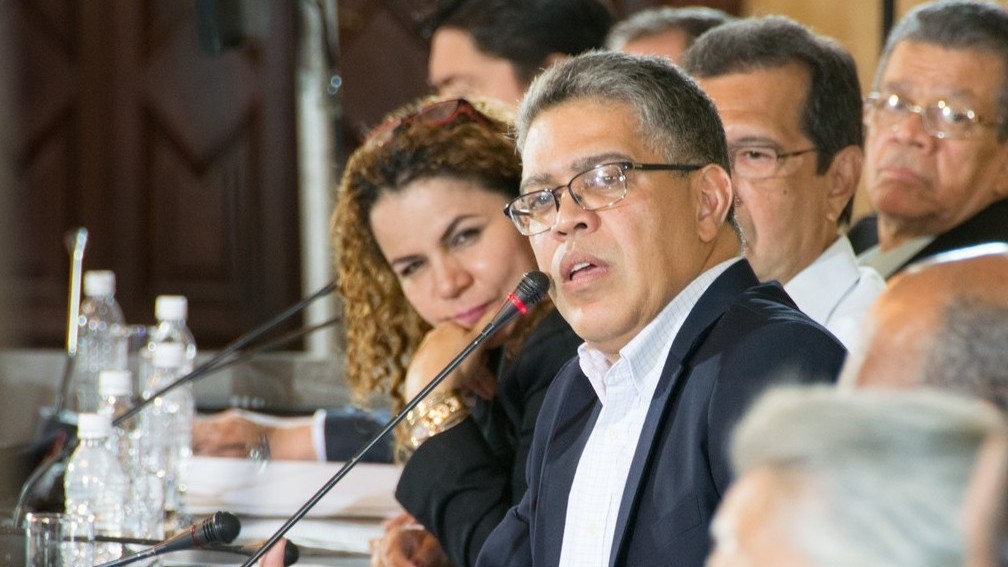
Head of the Presidential Commission for a Constituent Assembly,
Elías
Jaua speaks in Caracas, Venezuela with other Commission members, May
12, 2017.
This process was activated for the first time in Venezuela's modern history by President Hugo Chávez in 1999. Venezuela's 1961 constitution did not allow the people to be convened or renew the constitution, and President Chávez was able to establish a Constituent Assembly only on the basis of a consultative referendum with the parameters set by the country's Supreme Court. The 1999 constitution of the Bolivarian Republic of Venezuela, taking this into account not only permits a constitutional assembly to be called (by means of initiative by the President, other levels of government or by citizens) but prohibits the President from objecting to its results or any state authority from impeding its work (Articles 348 and 349).
The Constituent Assembly is to be elected directly by means of universal and secret ballot according to the voter registry. Half of its membership of 500 will be territorial representatives and half sectoral representatives. The working class will have the largest number of sectoral representatives, 100 people elected in the factories and other workplaces. Other recognized sectors with representation elected from amongst their peers will be small farmers and fishers, communes and social missions, youth, persons with disabilities, Indigenous peoples, businesspeople, cultural workers and pensioners. The new constitution it drafts will be approved by means of referendum.
The Presidential Commission will also consider nine "programmatic objectives" for the Constituent Assembly:
i. Securing peace as the need, right and yearning of
the
nation;
ii. Improving the national economic system towards
realizing Venezuela's potential;
iii. Constitutional recognition
of social programs and missions;
iv. Strengthening the ability of
the justice system and eradicating impunity;
v. Constitutional
recognition for the new forms of participatory and protagontistic
democracy, including through communes and communal councils as
well as workers' councils;
vi. Defence of the sovereignty and
integrity of the nation and defence against external
interventionism;
vii. Reaffirmation of the pluri-cultural
character of the homeland;
viii. Guaranteeing the future of the
youth;
viv. Preservation of life and the planet.
Note
1. Other members of the Presidential Commission include:
- Aristóbulo Istúriz (former
Vice-President, Minister of Education, Governor and leader of
Venezuela's teachers' association);
- Hermann Escarrá (professor of constitutional law and signatory
to Venezuela's 1999 constitution);
- Adán Chávez (Governor of Barinas state, former Minister
of Education);
- Isaías Rodríguez (former Vice-President, Senator and
Attorney General);
- Earle Herrera (journalist, poet and literary critic, professor at the
Central University of Venezuela and former member of the National
Assembly);
- Cilia Flores (lawyer and former President of the National Assembly);
- Delcy Rodríguez (Minister of Foreign Affairs);
- Iris Varela (Minister of Correctional Services, former constituent in
the 1999 Constituent Assembly);
- Noelí Pocaterra (member of Wayuu Indigenous nation, former
member of National Assembly and member if 1999 Constituent Assembly);
- Francisco Ameliach (former military officer, Governor of Carabobo
state and member of 1999 Constituent Assembly);
- Elvis Amoroso (constitutional lawyer and former member of Constituent
Assembly);
- Reinaldo Muñoz (Attorney General);
- Remigio Ceballos (Chief of Staff of the Strategic Operational Command
of the Bolivarian National Armed Forces).
Venezuela Begins Withdrawal from
Organization of American
States
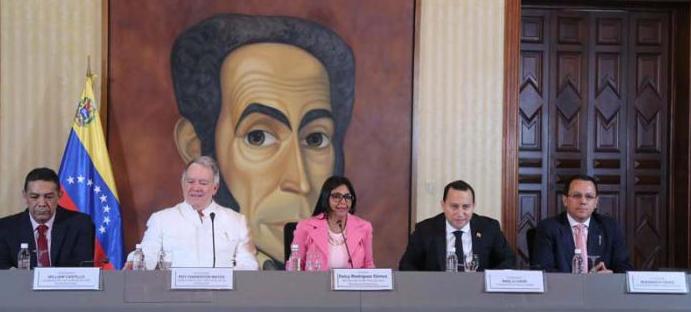
Venezuela's Foreign Minister, Delcy Rodríguez, announces
withdrawal
from Organization of American States, April 27, 2017. (AVN)
Venezuela began the process of withdrawing from the Washington, DC-based Organization of American States (OAS) on April 27. The decision came in response to the attempts of the U.S. imperialists, aided by Canada and other countries the U.S. has brought under its command, to use the OAS to intervene in the country's internal affairs.[1]
Venezuelan President Nicolás Maduro confirmed the decision and said that Venezuela "will continue its journey towards our true independence and nothing and nobody will stop us." Venezuela's Foreign Ministry Delcy Rodríguez on May 12 called the decision to withdraw "a major step forward," and said that the recent activities of the OAS confirm that the organization is an imperial instrument, of which Venezuela will never again be a part.[2]
Samuel Moncada, Venezuela's ambassador to the OAS, spoke in Caracas, Venezuela on May 12 on the decision and denounced U.S. pressure on sovereign countries in the OAS. The election of Donald Trump as U.S. President has brought increased pressure against all the countries of Latin American and the Caribbean, Moncada observed. After Trump was elected, the OAS increased its Permanent Council meetings to once per month instead of the norm of once per quarter. This is significant because the OAS is a multilateral body with the ability to punish member states, Moncada pointed out.
This ability to punish members, includes not only invoking the OAS "Democratic Charter" to suspend member countries, but also subsequent actions justified on that basis such as diplomatic, economic and financial sanctions. Cuba was suspended from the OAS in January 1962, a month before U.S. sanctions on the country were extended to prohibit virtually all exports.
 The U.S. imperialists have
increased pressure on individual countries in Latin America and the
Caribbean, particularly smaller countries that are reliant on U.S. aid
or remittances, Moncada explained. U.S. Senator Marco Rubio openly
threatened El Salvador, Dominica and Haiti that U.S. aid could be cut
off if they continued to resist U.S. attacks on Venezuela through the
OAS.
The U.S. imperialists have
increased pressure on individual countries in Latin America and the
Caribbean, particularly smaller countries that are reliant on U.S. aid
or remittances, Moncada explained. U.S. Senator Marco Rubio openly
threatened El Salvador, Dominica and Haiti that U.S. aid could be cut
off if they continued to resist U.S. attacks on Venezuela through the
OAS.
Pressure is also being applied to larger countries such as Mexico, which is facing the U.S. government's promised border wall to be built at Mexico's expense, as well as recent threats from Trump to unilaterally withdraw from NAFTA. As well, the U.S. threatens to deport 12 million Mexican nationals from the U.S., along with 50,000 Haitians and five million Salvadoreans. Caribbean nations, which have in large part defied U.S. dictate that they should join in the attack against Venezuela, are being subjected to constant pressure from the Trump administration, including from Secretary of State Rex Tillerson, and OAS Secretary-General Almagro, Moncada said.
As a result, the U.S. was able to use Mexico, along with Canada and others to spearhead a resolution against Venezuela at the OAS on April 3. That resolution did not secure support from a majority of OAS member states but was declared "adopted by consensus," despite the abstention of four member states and others having walked out in protest.
Moncada also denounced the role of the OAS in provoking violence inside Venezuela. Since the anti-Venezuela resolution was adopted on April 3, more than 50 Venezuelans have died as a result of counterrevolutionary protests and riots.[3] Moncada pointed out that the adoption of the spurious OAS resolution was cited as justification for the violence. He said it is likely that the next OAS meeting, currently set for May 31, will coincide again with increased counterrevolutionary violence.
This next OAS meeting aims to set up a "group of friends" to more closely coordinate the attacks against Venezuela, Moncada said. The Venezuelan people are becoming victims of efforts to secure results demanded by the U.S. in the OAS campaign against the country, and the violence and external interference go hand in hand, he noted. "We need to break the cycle, this macabre mechanism," Moncada said. "I pay tribute to countries in the OAS, 17 from the Caribbean and Central America in particular, who are resisting these pressures."
Notes
2. The withdrawal process takes 24 months to complete from its time of commencement. Venezuela will be the first country to leave the OAS of its own will; revolutionary Cuba was expelled in 1962 due to U.S. pressure. Although the expulsion was repealed in 2009, Cuba has affirmed that it has no intention of ever returning.
3. According to official Venezuelan figures provided on
May 12, seven of the victims were participating in protests, 18 were
not
participating, five cases were undetermined, and nine cases related to
an accident during the looting of a business in which individuals were
electrocuted. Three cases related to the actions of security forces,
for which various officers were arrested, while the government has
announced that the use of firearms by units assigned to demonstrations
is strictly prohibited.
(TML correspondent in Caracas)
Economist Details Economic War on Venezuela
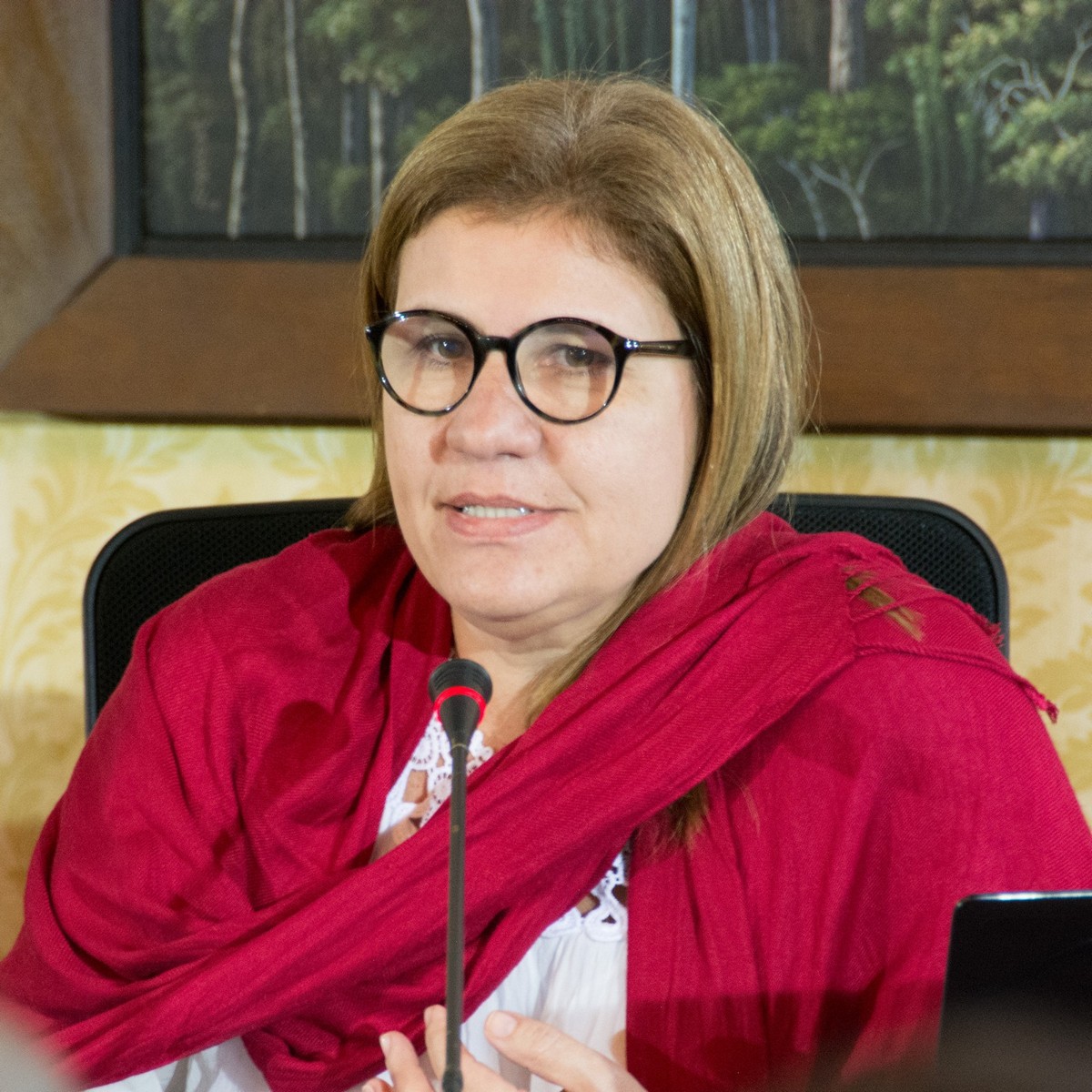 Pascualina Curcio, a noted
Venezuelan economist and Professor
in the Department of Economic and Administrative Sciences at
Simón Bolívar University met with foreign guests
and media in the country's capital, Caracas on May 12 to discuss
the efforts to destabilize Venezuela's economy. Since 2013,
Venezuela has faced inflation, shortages and other problems
mainly as a result of concerted sabotage, Curcio explained.
Pascualina Curcio, a noted
Venezuelan economist and Professor
in the Department of Economic and Administrative Sciences at
Simón Bolívar University met with foreign guests
and media in the country's capital, Caracas on May 12 to discuss
the efforts to destabilize Venezuela's economy. Since 2013,
Venezuela has faced inflation, shortages and other problems
mainly as a result of concerted sabotage, Curcio explained.
Behind the apparent economic problems is a political problem, Curcio said. Before 1999, Venezuela's gross domestic product (GDP) increased alongside poverty. After 1999, when the country began its Bolivarian Revolution under the leadership of President Hugo Chavez, GDP increased while poverty decreased. From the beginning, this was presented as a failed economic model, but a failure for whom? For owners of capital, or for the poor and workers? Curcio asked. The monopoly corporations and international financiers threatened by this model have undertaken sabotage.
The results of the sabotage are then presented as a caricature to "prove" the failures of socialism, Curcio noted. It is not simply sabotage of "the economy," as it is the people who are directly affected and suffer, she said. Nor are the problems the result of a decline in GDP due to the oil price collapse, as GDP remains well above what it has been for the past 30 years. Despite difficulties, food consumption per capita remains far higher than during the 1980s and '90s, particularly during periods of crisis, due to the efforts of the government to ensure food staples reach the population.
Curcio identified three mechanisms through which the economic war is being waged against Venezuela:
1. Removal of certain basic goods from circulation by monopoly firms and wholesalers. While fruits and vegetables and many other products are in wide supply, some other staple products such as bread are in short supply. Missing goods continue to be produced, and are found at illegal markets, but the distribution pattern is distorted, Curcio said. This is despite the government providing the foreign currency necessary for any staples that must be imported, she said.
2. Induced inflation, the deliberate devaluing of Venezuela's currency, the bolivar. Venezuela, like many Latin American countries, is reliant on imports for many significant products. As a result, prices inside the country depend highly on prices internationally, and there is an illegal black market for currency in opposition to the fixed rate of conversion of bolivars to dollars and vice-versa. This manipulated rate then becomes a reference point for internal prices.
Many importers, big monopolies, do not use the fixed rate of 10 bolivars per dollar but use the black market exchange rate, which is hundreds of times more. As a result, prices increase dramatically, and this is encouraged by web pages which "set" black market exchange rates. Normally, inflation corresponds to a decrease in production, but there has been no decrease in production sufficient to explain the level of inflation Venezuela is experiencing. It is linked to black market indicators, Curcio said.
3. International financial blockade. Venezuela is considered the "highest risk" country in the world by international financial lenders with 2,000 "points," Curcio said, noting that each "point" corresponds roughly to a percentage point of interest on debt. Venezuela has the largest oil reserves in the world, some of the largest fresh water reserves in the world, gold mines and many other resources, and it is considered "risky," Curcio noted. As a result, since oil prices collapsed in 2013, financing has been prohibitively expensive. Other hostile actions include Citibank closing Venezuela's account due to this "risk," while maintaining private accounts based in Venezuela.
Curcio noted that the intensity of this sabotage
changes
with
the political situation in the country. Immediately before the
2015 National Assembly elections, the availability of corn flour
sharply decreased, while products began to appear again after the
election, in which the pro-U.S., oligarchic parties won a
majority. One mechanism to deal with sabotage of the food supply
was the creation of local food distribution committees, the
CLAPs, which take the provision of food staples out of the hands
of the monopolies. The continued sabotage of the Venezuelan
people's food supply and refusal of private companies to ensure
the provision of necessities has led Venezuela to consider this a
political problem that must be tackled, Curcio affirmed.
(TML correspondent in Caracas)
Liberation of Puerto Rican Independence Fighter
Oscar López Rivera Is Free!
All Power to the People's
Movements!

Puerto Rican independence fighter Oscar López Rivera was released on May 17 after nearly 36 years as a political prisoner in the United States. López's sentence was commuted on January 17 by outgoing U.S. President Obama.
The Communist Party of Canada (Marxist-Leninist) joins with all those celebrating this achievement and sends its warmest greetings and congratulations to Oscar, his family and legal team, other patriots who faced similar imprisonment and most importantly to the Puerto Rican people's movements for the liberation of political prisoners and their self-determination. CPC(M-L) takes this occasion to reiterate its unwavering support for the struggle of Puerto Rico for its independence from U.S. colonialism.
 In 1981, López was
convicted without proof on bogus charges of
seditious conspiracy and given a 55-year sentence. Charges of
sedition have been a main method used by the U.S. against Puerto
Rican patriots since 1936. That year, Pedro Albízu Campos,
founder of the Puerto Rican Nationalist Party and nine others were
charged with forcibly attempting to overthrow the government of the
United States and jailed in the U.S. for 10 years. Another wave of
attacks against the movement for independence came in the late 1970s to
early 1980s when dozens of Puerto Ricans, including Oscar López
Rivera, were charged with sedition. In all instances, it is the
people's movement that has brought the struggle forward to the next
stage. Its defence of Puerto Rico's right to be, liberation of the
political prisoners and removal of the U.S. navy from the country have
all been important milestones in Puerto Rico's fight for independence.
In 1981, López was
convicted without proof on bogus charges of
seditious conspiracy and given a 55-year sentence. Charges of
sedition have been a main method used by the U.S. against Puerto
Rican patriots since 1936. That year, Pedro Albízu Campos,
founder of the Puerto Rican Nationalist Party and nine others were
charged with forcibly attempting to overthrow the government of the
United States and jailed in the U.S. for 10 years. Another wave of
attacks against the movement for independence came in the late 1970s to
early 1980s when dozens of Puerto Ricans, including Oscar López
Rivera, were charged with sedition. In all instances, it is the
people's movement that has brought the struggle forward to the next
stage. Its defence of Puerto Rico's right to be, liberation of the
political prisoners and removal of the U.S. navy from the country have
all been important milestones in Puerto Rico's fight for independence.
CPC(M-L) also highlights the outstanding contributions of an exemplar of this movement, the late Dr. Luis Nieves Falcón and the Puerto Rican Committee for Human Rights who fought and organized tirelessly for the freedom of the Puerto Rican political prisoners. Dr. Nieves Falcón and the committee contributed greatly to popularizing their cause and to uniting and mobilizing all sectors of Puerto Rico for their freedom and for national independence, most vividly shown in the historic march of 100,000 people in San Juan on August 29, 1999. Without the foundations laid by this work, López's liberation surely would not have been possible.
CPC(M-L) is confident that Oscar López Rivera and all who have come after him will continue to make a great contribution to the cause of the Puerto Rican people and that this victory will inspire them towards still greater undertakings.

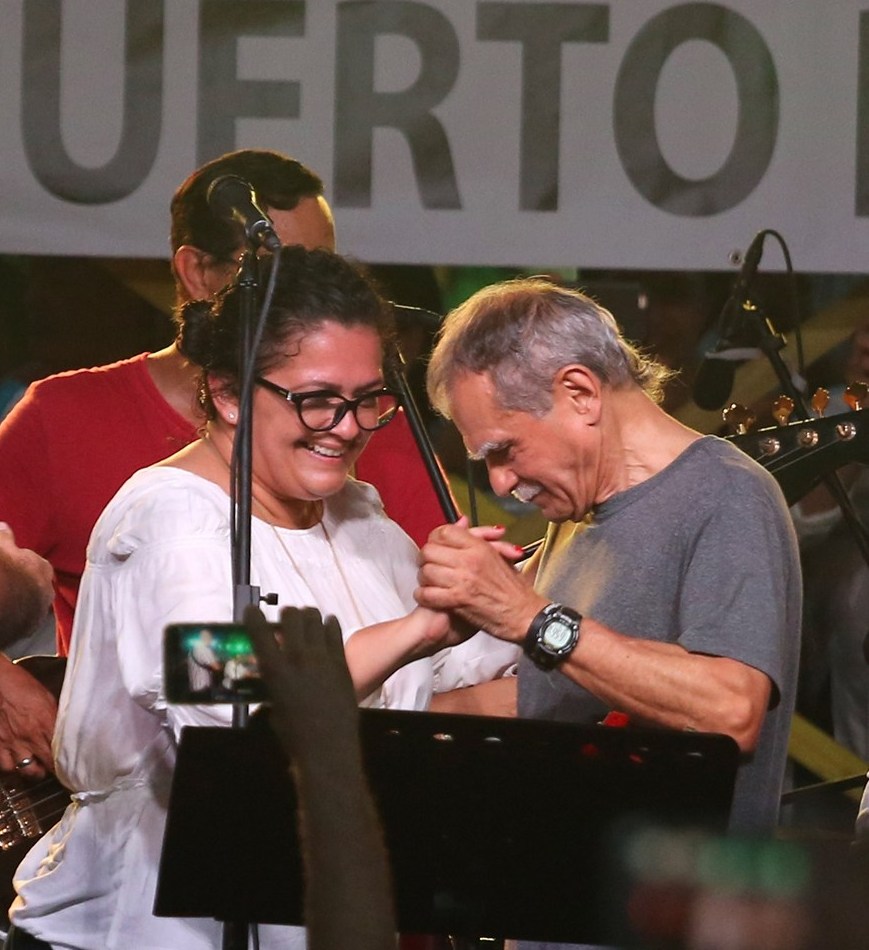


Celebrations in San Juan, Puerto Rico, May 17, 2017.
(Photos: J. Alicea, J. Coasta)
Opposition to U.S. Provocations on Korean Peninsula
New South Korean President Pledges to Work
for Peace and
Stability
On May 9, Moon Jae-in was elected the 19th President of the Republic of Korea (south Korea). Moon is a 64-year old former student political activist, human rights lawyer and currently a leader with the Minjoo political party. Moon was also Chief of Staff to the late south Korean President Roh Moon-hyun who served from 2002-2007 and under whose presidency relations between north and south Korea became stronger and culminated in the October 2007 Agreement that further advanced the aim of national reunification.
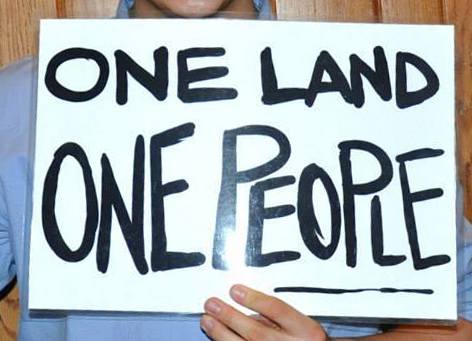 Moon received almost 42 per
cent of the votes cast by the 77.2 per cent of the electorate who cast
a ballot. This was the highest voter turnout in two decades. Former
south Korean prosecutor Hong Joon-pyo, was the first runner-up, with
25.5 per cent of the votes cast.
Moon received almost 42 per
cent of the votes cast by the 77.2 per cent of the electorate who cast
a ballot. This was the highest voter turnout in two decades. Former
south Korean prosecutor Hong Joon-pyo, was the first runner-up, with
25.5 per cent of the votes cast.
The presidential elections were triggered by the massive protests undertaken by south Koreans at the end of 2016 and early 2017 to demand that president Park Guen-hye step down in the wake of a corruption scandal that rocked her administration. They were also opposed to her humiliating and servile attitude towards the U.S. imperialists, and open antipathy towards the government and people of the Democratic People's Republic of Korea (DPRK). It was revealed that the Park government had extorted tens of millions of dollars from the largest south Korean monopolies such as Samsung, in exchange for political favours and the passing of anti-labour laws. Park was impeached and is in prison awaiting trial for her crimes.
Leading up to the elections, Moon stated that if elected, his administration would work hard to heal the wounds of almost a decade of conservative rule in south Korea. He even pledged to re-open the Kaesong Industrial Complex[1] and facilitate normalization of relations between the DPRK and the Republic of Korea (ROK). Moon also promised to revisit the decision by the previous government to permit the U.S. to install a missile defence system in south Korea, which is opposed by the majority of the Korean people, and to put it to a referendum. Among other things, Moon also pledged to fight corruption and rein in the political power and privileges of the big multinational companies.
Media reports indicate that the south Korean people want "structural change" in south Korea because they know only too well how the U.S. imperialists intervene to overthrow governments which defend the interests of the Korean people. They have always been opposed to the U.S. imperialist use of their territory to keep the Korean nation divided and have found that previous governments have betrayed them, especially under pressure from the U.S. imperialists. Thus they are determined to keep the political initiative in their hands.
Note
1. The Kaesong Industrial Complex began as a joint north-south venture in 2004. More than 125 south Korean companies employed almost 60,000 workers from the DPRK in Kaesong, on the north side of the 38th parallel which divides the Korean peninsula, to produce goods for domestic and foreign markets, including textiles, semi-conductors, ceramics and other items. It was a concrete example of the potential that existed for further co-operation between north and south which was a direct consequence of the historic Joint Declaration signed June 15, 2000. In March 2016, the Park government shut down the enterprise -- a move that was opposed by almost 85 per cent of south Koreans.
(With files from Hankyoreh)
No to U.S. War Provocations Against the Korean People! Defend Peace on the Korean Peninsula!
|
At the end of April this year, the U.S. and the south Korean military concluded their annual and illegal Key Resolve/Foal Eagle joint military exercises targeting the Democratic People's Republic of Korea (DPRK). It was the largest such exercise in forty years. Besides live and simulated drills involving more than 330,000 U.S. and south Korean troops, the exercises included the deployment of the Nimitz-class super aircraft carrier USS Carl Vinson as well as practice bombing sorties by two U.S. B-1B bombers, each capable of launching nuclear missiles and bombs. These aggressive war exercises have been part of OPLAN 5015, an agreement between the U.S. military and south Korea, which includes planning pre-emptive strikes against the DPRK's military sites, "decapitation raids" against the DPRK's leadership and other drills for launching war and imposing regime change in the DPRK. The aim is blatantly clear -- to wage a second Korean war against the DPRK, and turn it into a colony of the U.S., just like south Korea.
In the face of U.S. aims to nullify its very existence, the DPRK has been forced to divert major resources into all measures required to defend its people and their sovereignty. On April 26, the DPRK's Foreign Ministry stated, "The policy pursued by the U.S. to isolate and stifle the DPRK and the nuclear threat posed by the U.S. to the DPRK for more than half a century are the root cause of pushing the DPRK to have access to nukes."
At the same time, the government of the DPRK is doing everything it can on the diplomatic front to seek a political solution to end these acts of war by the U.S. Its repeated complaints to the United Nations Security Council (UNSC) have fallen on deaf ears since the UNSC itself has been turned by the U.S. and other big powers into an instrument of war and aggression where police powers have replaced rule of law and the UN Charter itself.
The ongoing disinformation campaign against the DPRK spun by the monopoly media and even the publicly-funded Canadian Broadcasting Corporation beat the war-drums against the DPRK by painting the DPRK as the "aggressor" and "threat" on the Korean peninsula. Turning truth on its head, this disinformation is aimed at neutralizing the Canadian people's striving for peace on the Korean peninsula and their historic opposition to the U.S. warmongers and their long and bloody legacy around the world.
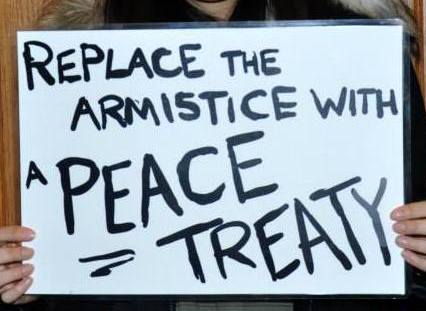 In addition, the
demonization of the DPRK and its leadership deliberately ignores the
ongoing diplomatic efforts by the DPRK to secure peace on the Korean
peninsula. Not once, for example, has the CBC mentioned the many
appeals made by the DPRK directly to the U.S. that the latter sign a
peace treaty with it as required by the Korean Armistice Agreement
(KAA) signed on July 27, 1953. In fact, the U.S. has not only rebuffed
these proposals from the DPRK year after year, it has violated every
article of the KAA, including by introducing nuclear weapons onto the
Korean peninsula for more than 50 years. This intransigence on the part
of the U.S. clearly shows who is for peace and who is for war on the
Korean peninsula. There is no reason for the U.S. not to sign a peace
treaty with the DPRK except that it has another agenda -- to take over
the entire Korean peninsula for its own narrow geopolitical interests
and to keep the Korean people enslaved so that they do not threaten
U.S. hegemonic interests in East Asia as a united, sovereign people who
stand for peace. In this regard, in late April this year, the Trump
administration moved quickly to install the Terminal High Altitude Area
Defence (THAAD) missile battery in south Korea despite the massive
opposition and ongoing protests of the Korean people. This was done to
make sure that no matter who won the south Korean presidential
elections of May 10, the THAAD would be a done deal. To add insult to
injury, the Trump administration expects the south Korean people to
foot the bill of U.S.$1 billion. Canadians must stand with the Korean
people in opposing the THAAD missile defence in light of their own
history of opposing U.S. Cruise Missile testing in Canada and their
firm opposition to the plans of the Trudeau Liberal government to
permit U.S. Missile Defence on Canadian soil.
In addition, the
demonization of the DPRK and its leadership deliberately ignores the
ongoing diplomatic efforts by the DPRK to secure peace on the Korean
peninsula. Not once, for example, has the CBC mentioned the many
appeals made by the DPRK directly to the U.S. that the latter sign a
peace treaty with it as required by the Korean Armistice Agreement
(KAA) signed on July 27, 1953. In fact, the U.S. has not only rebuffed
these proposals from the DPRK year after year, it has violated every
article of the KAA, including by introducing nuclear weapons onto the
Korean peninsula for more than 50 years. This intransigence on the part
of the U.S. clearly shows who is for peace and who is for war on the
Korean peninsula. There is no reason for the U.S. not to sign a peace
treaty with the DPRK except that it has another agenda -- to take over
the entire Korean peninsula for its own narrow geopolitical interests
and to keep the Korean people enslaved so that they do not threaten
U.S. hegemonic interests in East Asia as a united, sovereign people who
stand for peace. In this regard, in late April this year, the Trump
administration moved quickly to install the Terminal High Altitude Area
Defence (THAAD) missile battery in south Korea despite the massive
opposition and ongoing protests of the Korean people. This was done to
make sure that no matter who won the south Korean presidential
elections of May 10, the THAAD would be a done deal. To add insult to
injury, the Trump administration expects the south Korean people to
foot the bill of U.S.$1 billion. Canadians must stand with the Korean
people in opposing the THAAD missile defence in light of their own
history of opposing U.S. Cruise Missile testing in Canada and their
firm opposition to the plans of the Trudeau Liberal government to
permit U.S. Missile Defence on Canadian soil.
All justice- and peace-loving people in Canada and abroad must stand with the Korean people against U.S.-led war preparations no matter what pretext. The extremely dangerous situation on the Korean peninsula, which could easily trigger a second Korean War and engulf the world in World War Three is not the making of the DPRK. All measures must be taken to stay the hands of the imperialist warmongers in the U.S. and Canada in their drive for war on the Korean peninsula.
The Government of Canada must make amends for the fact that Canada joined the U.S. in intervening in the civil war in Korea which Canada had no business being involved in. This was a mere five years after the Korean people played a heroic role in defeating Japan and the Axis powers and securing peace for humanity in the Second World War. Canada must also move to normalize relations with the DPRK, that were established in 2001, based on the principle of peace and non-interference in each others affairs. On that basis, trade relations and other links can take place for the mutual benefit of both countries. That would be a positive contribution to promoting peace and stability on the Korean Peninsula.
No to U.S. Aggression and Sanctions
Against the DPRK!
Dismantle the U.S. THAAD Missile Defence in South Korea!
U.S.
Sign A Peace Treaty with the DPRK Now!
Canada Normalize
Relations with the DPRK Now!
U.S. Troops Out of Korea!
Website: www.cpcml.ca Email: editor@cpcml.ca
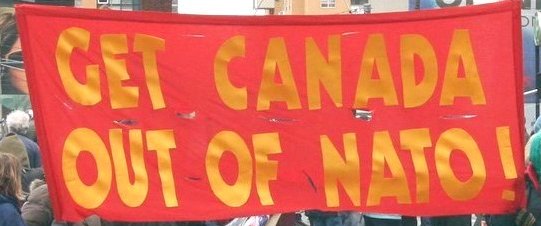
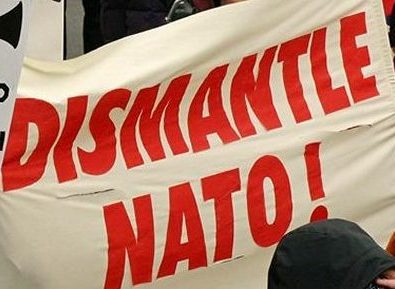 Far from settling conflicts
through peaceful means, NATO is an instrument of choice to violate the
Charter of the United Nations and post-war arrangements which enforced
an international rule of law. It is wracked by contradictions as a
result of the striving of the big powers of Europe to advance their own
interests and thus, the U.S. imperialists are threatening them also
with dire consequences if they do not submit to U.S. nuclear blackmail.
Far from settling conflicts
through peaceful means, NATO is an instrument of choice to violate the
Charter of the United Nations and post-war arrangements which enforced
an international rule of law. It is wracked by contradictions as a
result of the striving of the big powers of Europe to advance their own
interests and thus, the U.S. imperialists are threatening them also
with dire consequences if they do not submit to U.S. nuclear blackmail. Days before the meeting,
media report that, according to White House officials, the U.S. will
threaten to leave the aggressive military bloc unless there are "faster
and more concrete developments" and instead "form a different way of
going about things."
Days before the meeting,
media report that, according to White House officials, the U.S. will
threaten to leave the aggressive military bloc unless there are "faster
and more concrete developments" and instead "form a different way of
going about things."

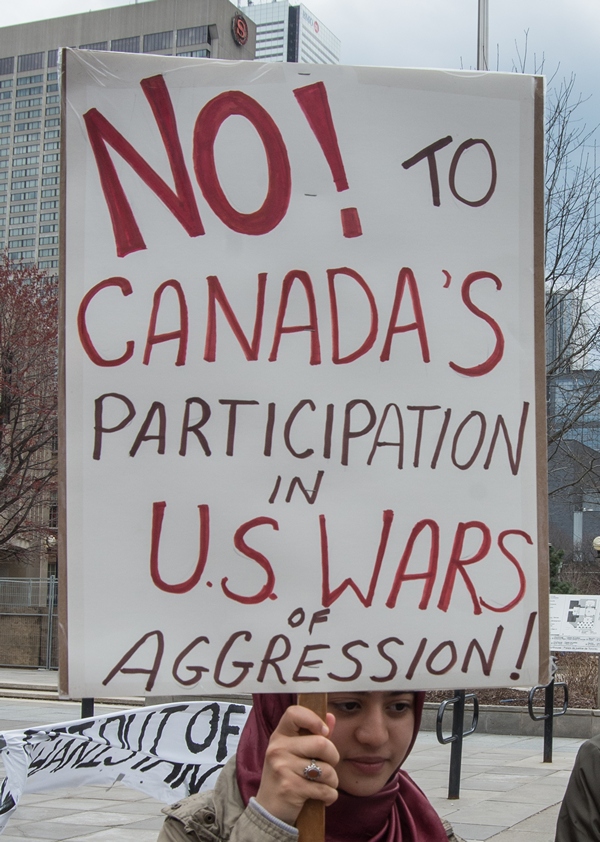 It is in fact the demand of
the U.S. Trump administration that all NATO member states increase
their defence spending to amount to two per cent of the country's gross
domestic product. Canada presently spends just less than one per cent,
and to meet this demand will more than double annual military spending.
The Trudeau government's position has been to agree with the two per
cent requirement in "principle" while arguing that other expenses
besides the upkeep of the armed forces should be considered as
contributions to this number. Now, complying with U.S. demands without
question is what the "new defence policy" will be all about.
It is in fact the demand of
the U.S. Trump administration that all NATO member states increase
their defence spending to amount to two per cent of the country's gross
domestic product. Canada presently spends just less than one per cent,
and to meet this demand will more than double annual military spending.
The Trudeau government's position has been to agree with the two per
cent requirement in "principle" while arguing that other expenses
besides the upkeep of the armed forces should be considered as
contributions to this number. Now, complying with U.S. demands without
question is what the "new defence policy" will be all about.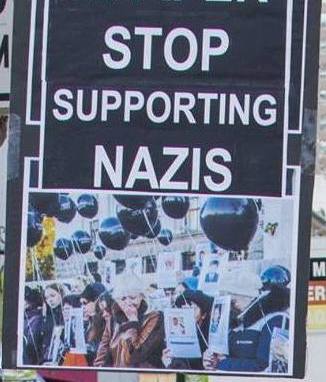 A main preoccupation of the
2017 Sedona Forum was to give a podium to those it called "Victims of
Putin's Aggression," as well as work out what to do about Russia and
relations with China following the election of Donald Trump.[
A main preoccupation of the
2017 Sedona Forum was to give a podium to those it called "Victims of
Putin's Aggression," as well as work out what to do about Russia and
relations with China following the election of Donald Trump.[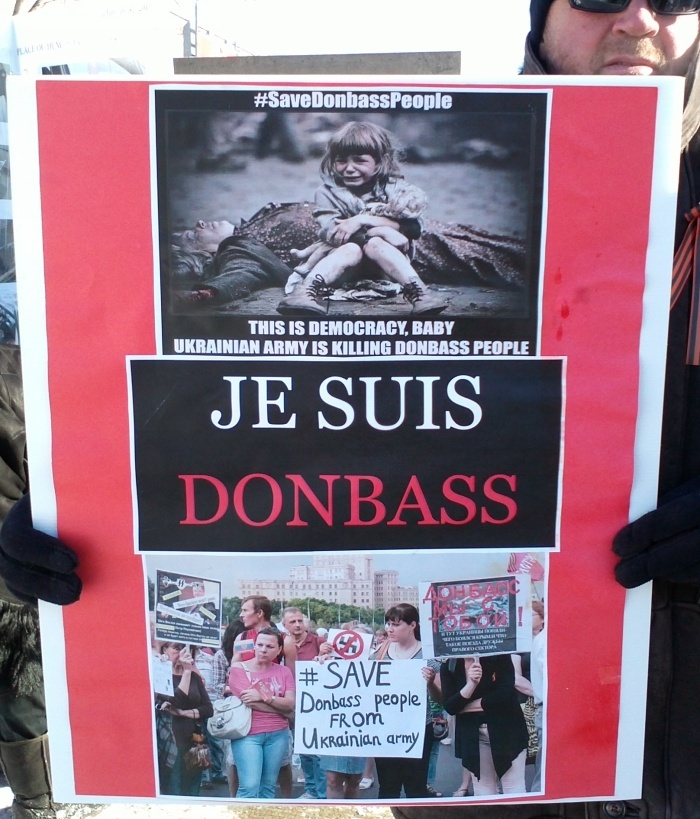 These weapons are in
addition to those already being supplied by DND since August 2014 to
combat the Donbass republics for what it calls "Russian aggression."
Canada has supplied the coup government with some $18 million in just
two years for what it perversely calls "non-lethal weapons." In
parallel, it assists so-called NGOs such as Armiya (Army) SOS, which
has been granted charitable status and openly delivers lethal weapons
to the frontline fascist militias integrated into the National Guard of
Ukraine, as even the media admits. There are credible reports of
clandestine shipments of arms from NATO countries, including Canada,
and that NATO has supplied the Kiev regime with deadly cluster bombs
that are being used against the civilian population of the Donbass
region of eastern Ukraine. and those who refuse to accept the
legitimacy of the Ukrainian government established through a coup
d'état. According to the Poroshenko government and the media,
what is decisive to settling the conflict in Ukraine are the quality
and firepower of modern weapons and not politics, the justice of the
cause, the rule of law or the principles of international law.
These weapons are in
addition to those already being supplied by DND since August 2014 to
combat the Donbass republics for what it calls "Russian aggression."
Canada has supplied the coup government with some $18 million in just
two years for what it perversely calls "non-lethal weapons." In
parallel, it assists so-called NGOs such as Armiya (Army) SOS, which
has been granted charitable status and openly delivers lethal weapons
to the frontline fascist militias integrated into the National Guard of
Ukraine, as even the media admits. There are credible reports of
clandestine shipments of arms from NATO countries, including Canada,
and that NATO has supplied the Kiev regime with deadly cluster bombs
that are being used against the civilian population of the Donbass
region of eastern Ukraine. and those who refuse to accept the
legitimacy of the Ukrainian government established through a coup
d'état. According to the Poroshenko government and the media,
what is decisive to settling the conflict in Ukraine are the quality
and firepower of modern weapons and not politics, the justice of the
cause, the rule of law or the principles of international law.

